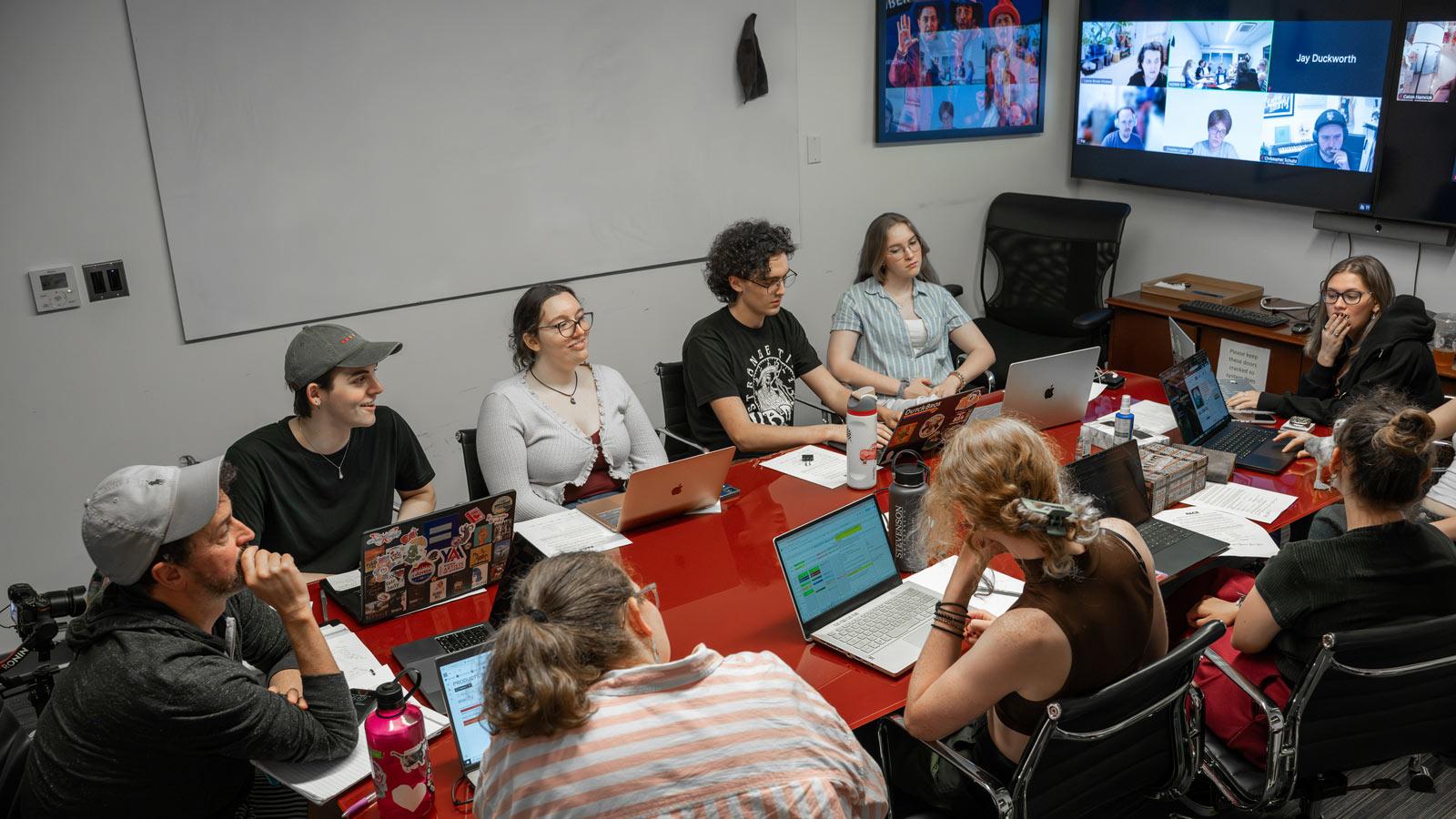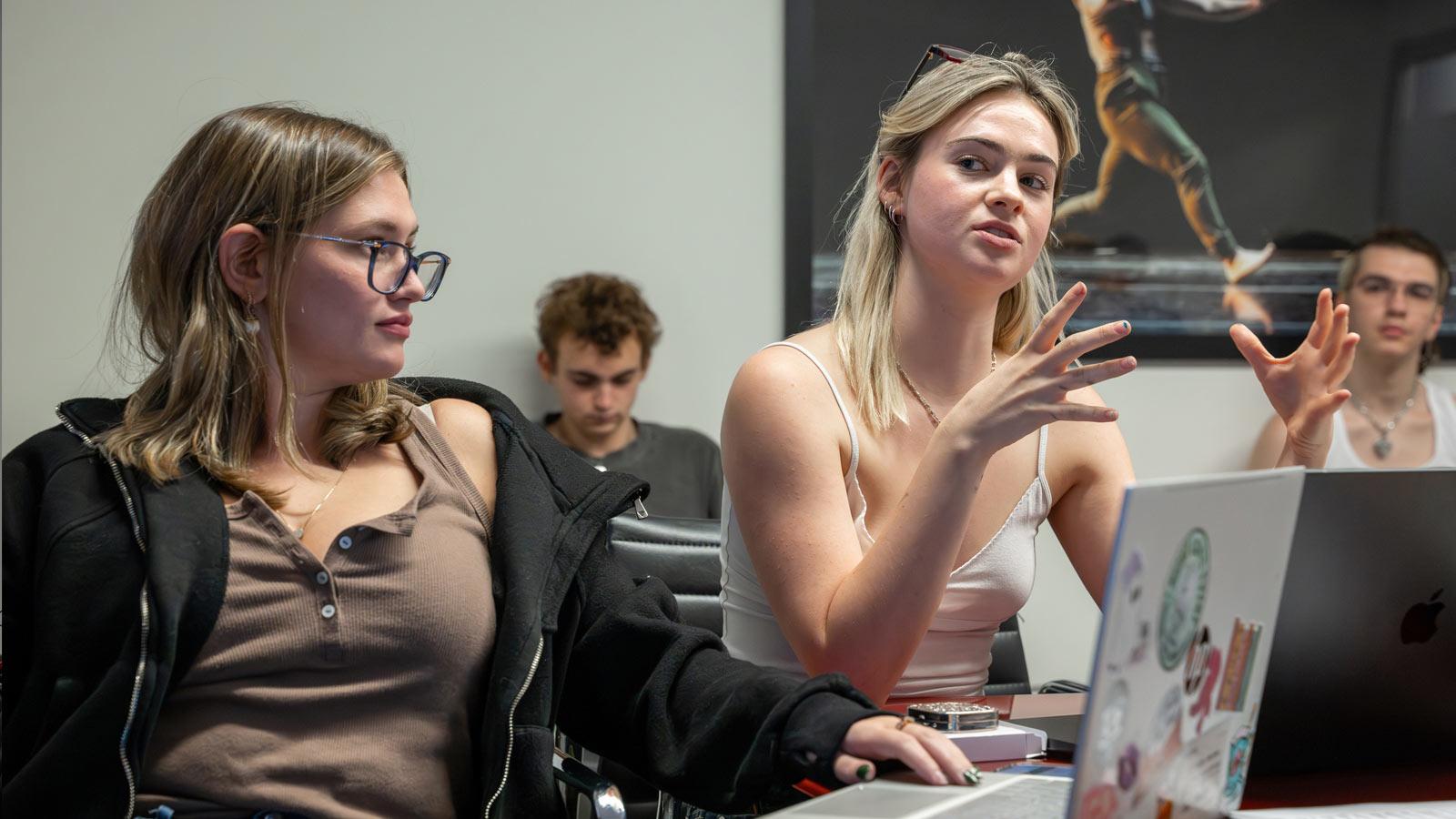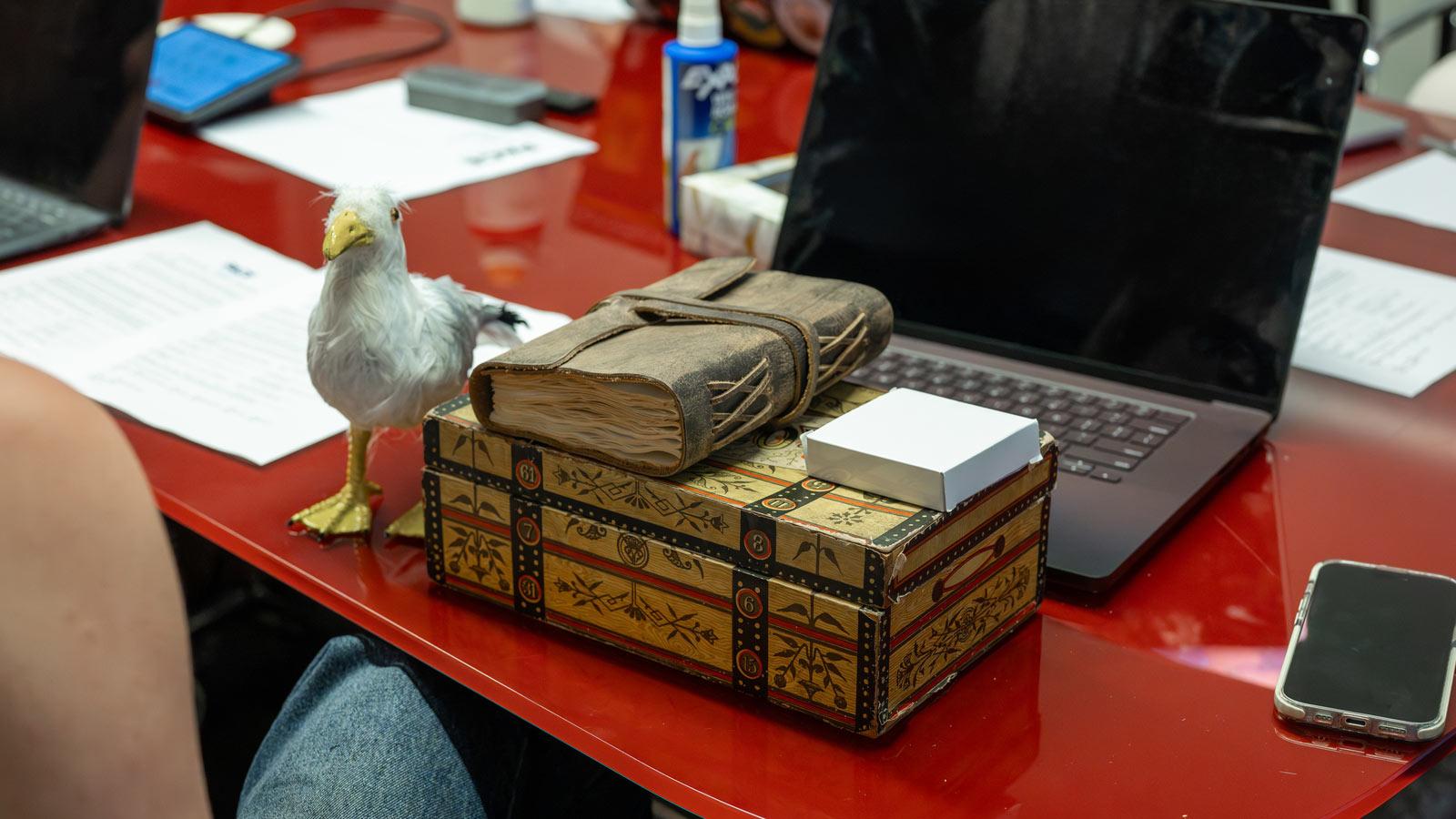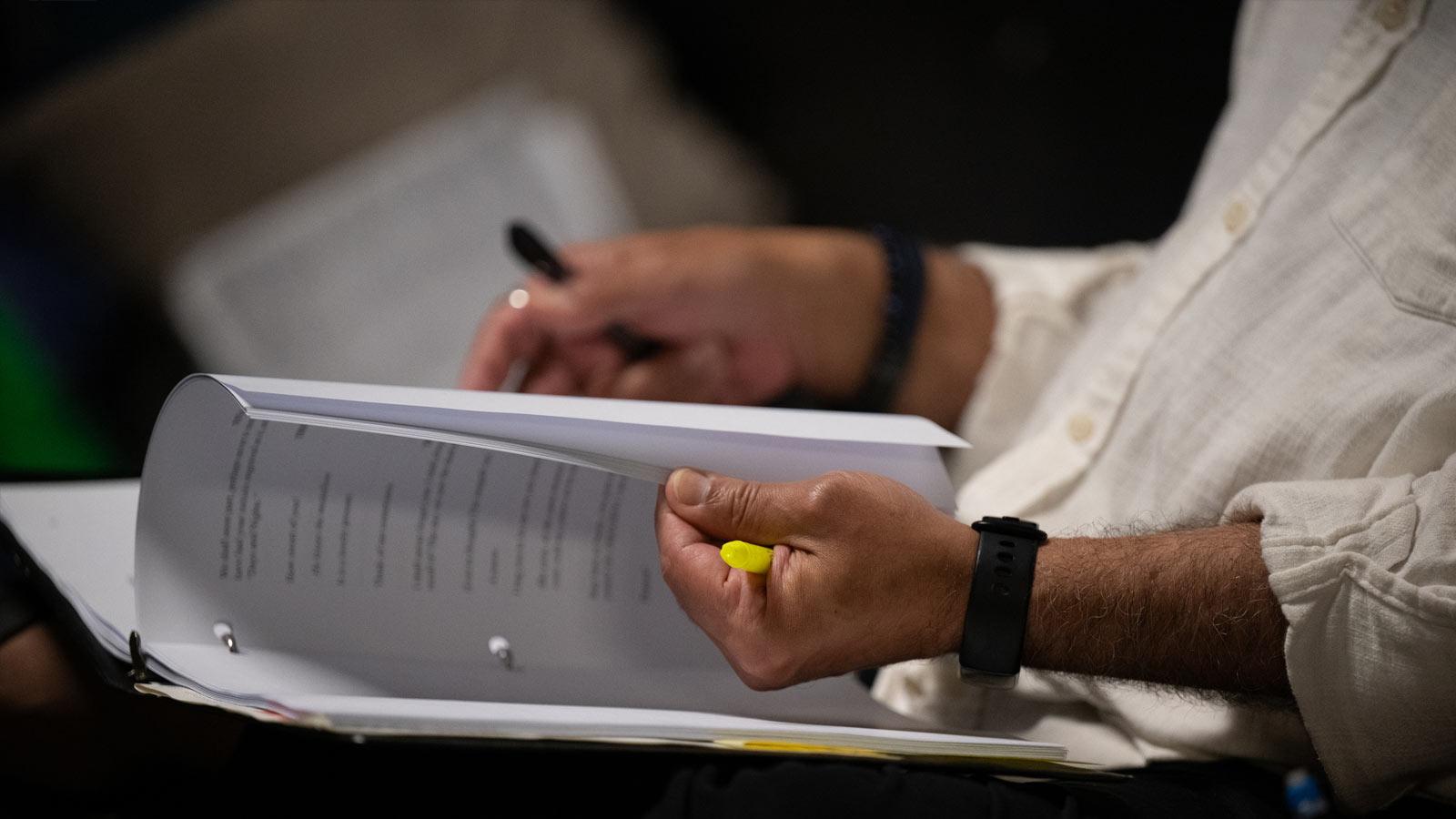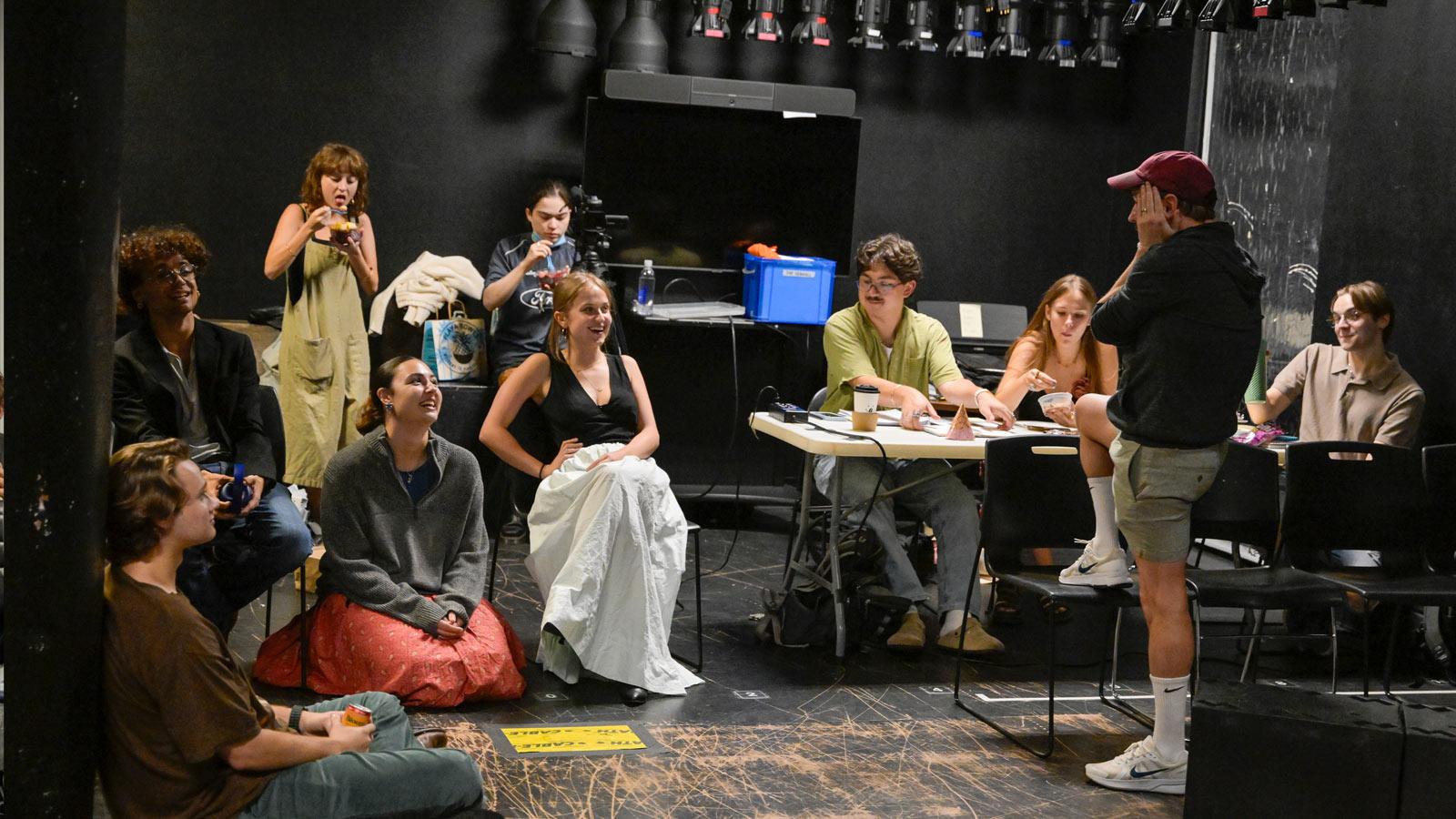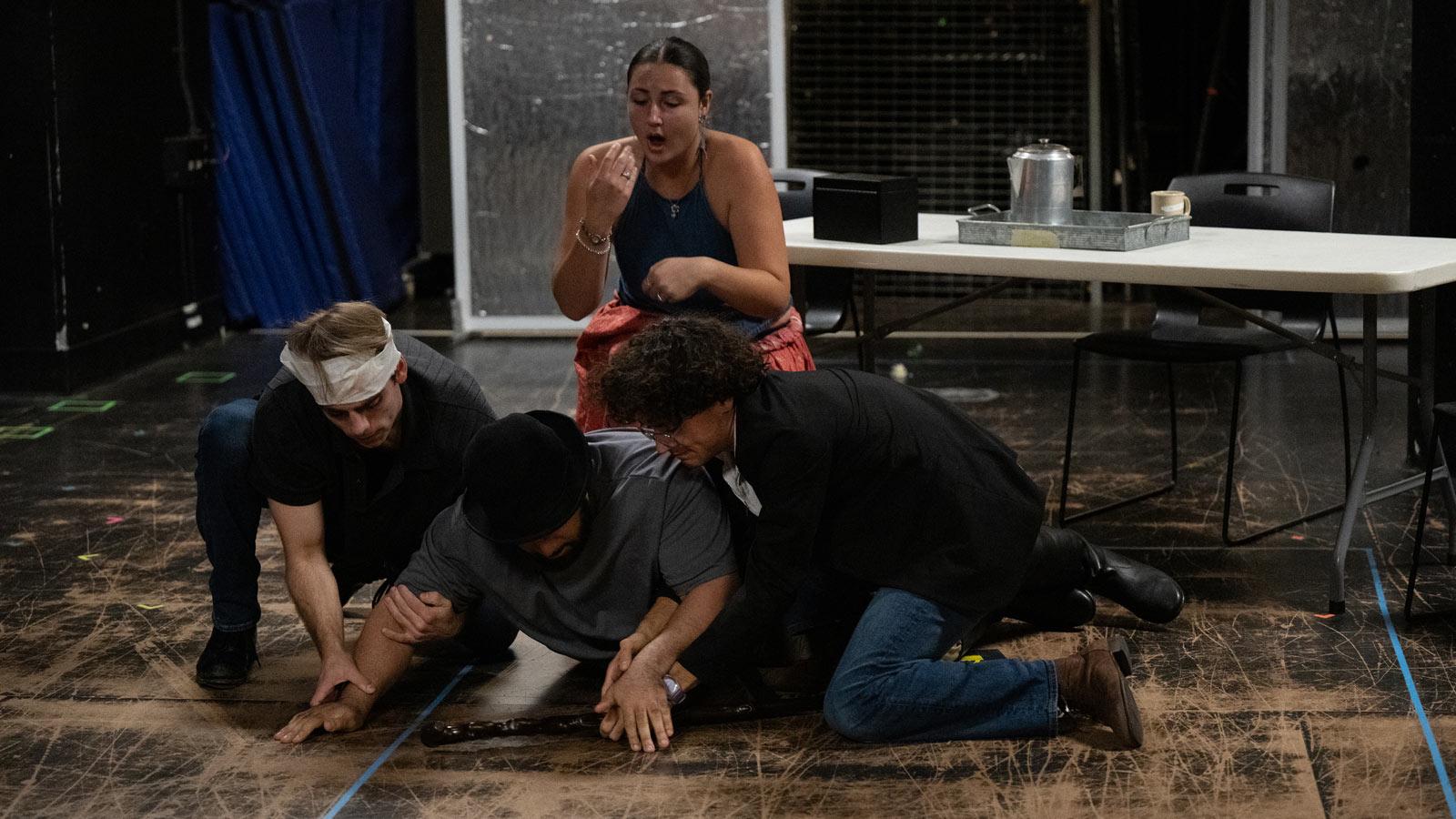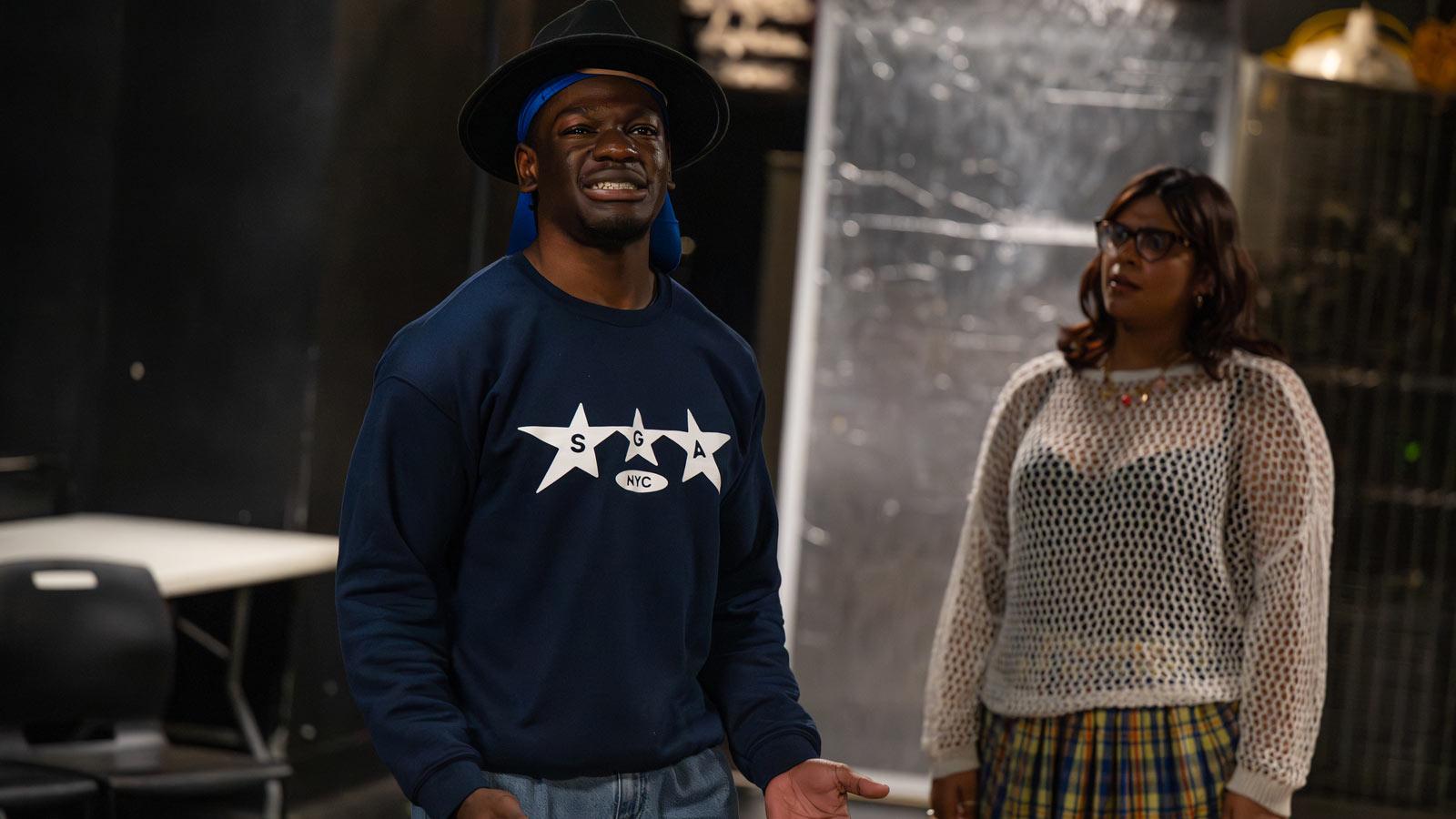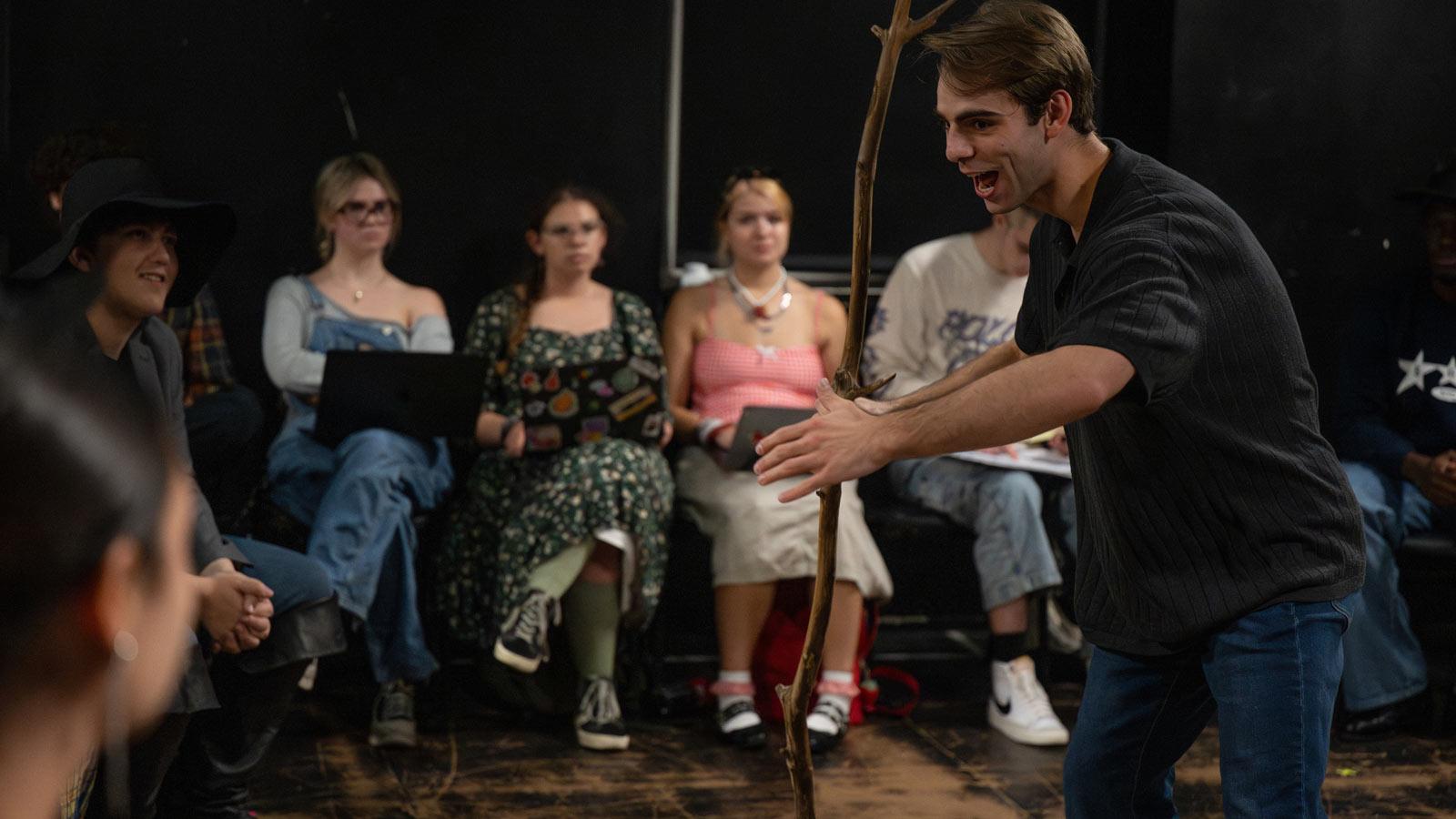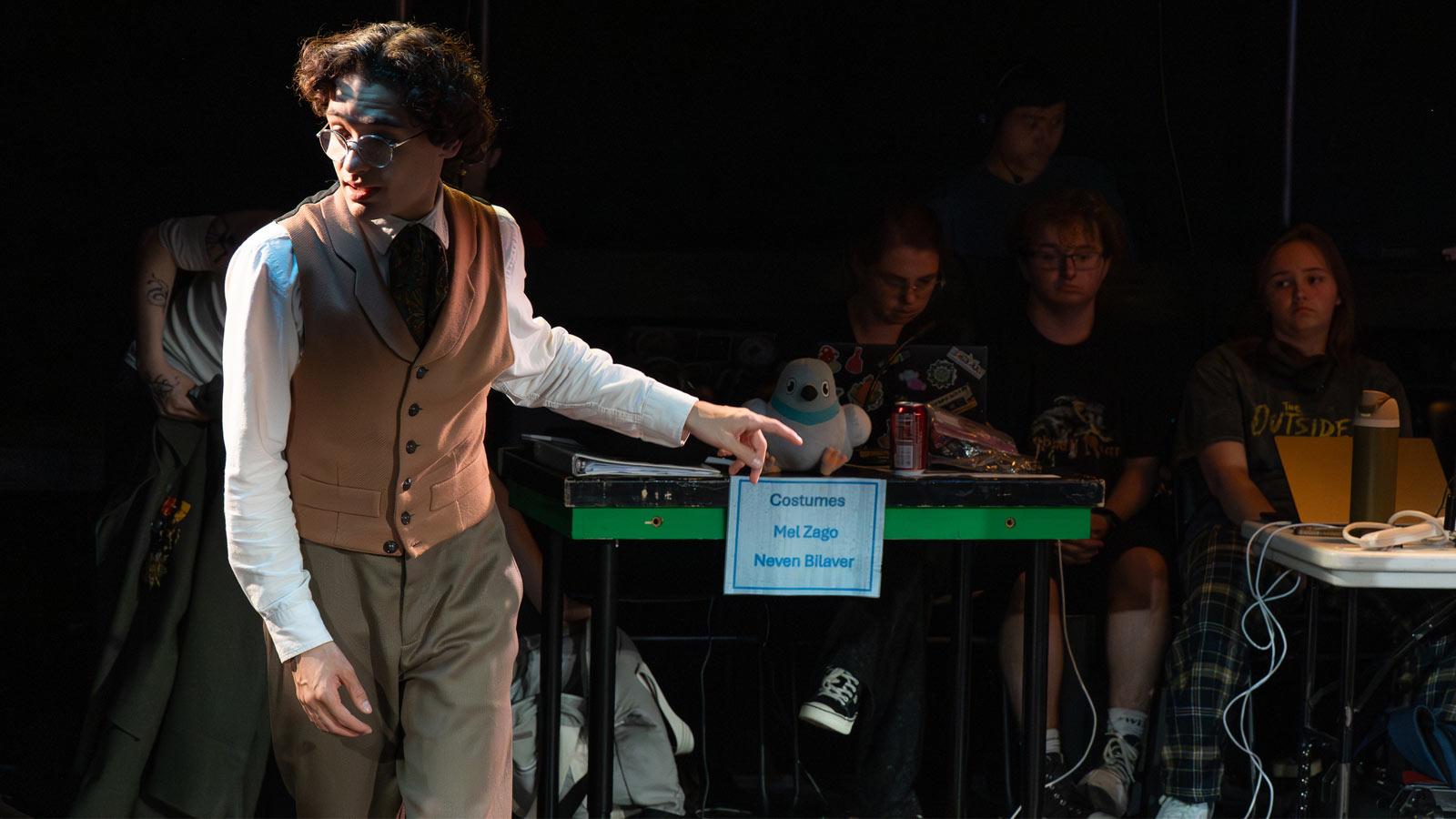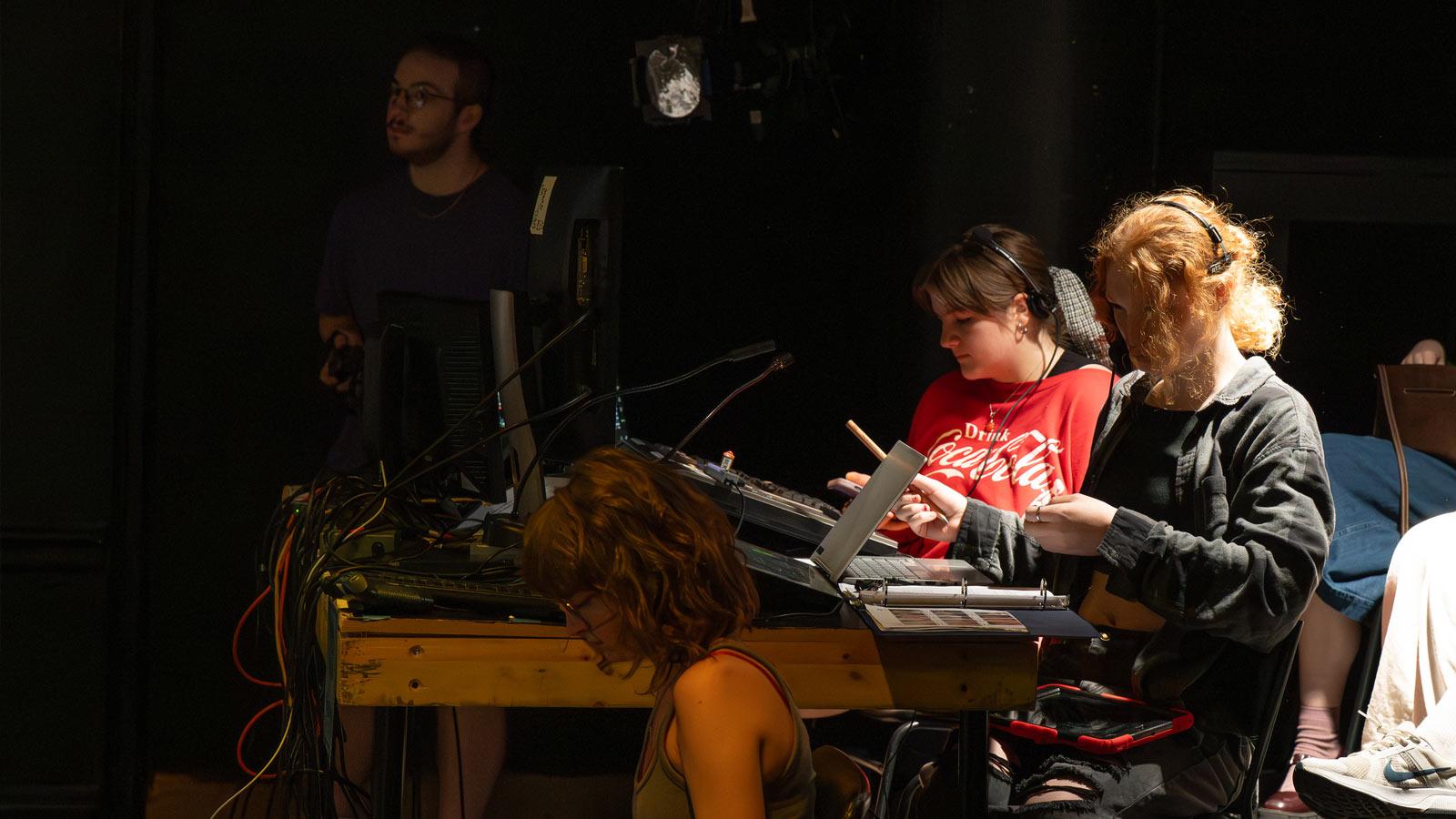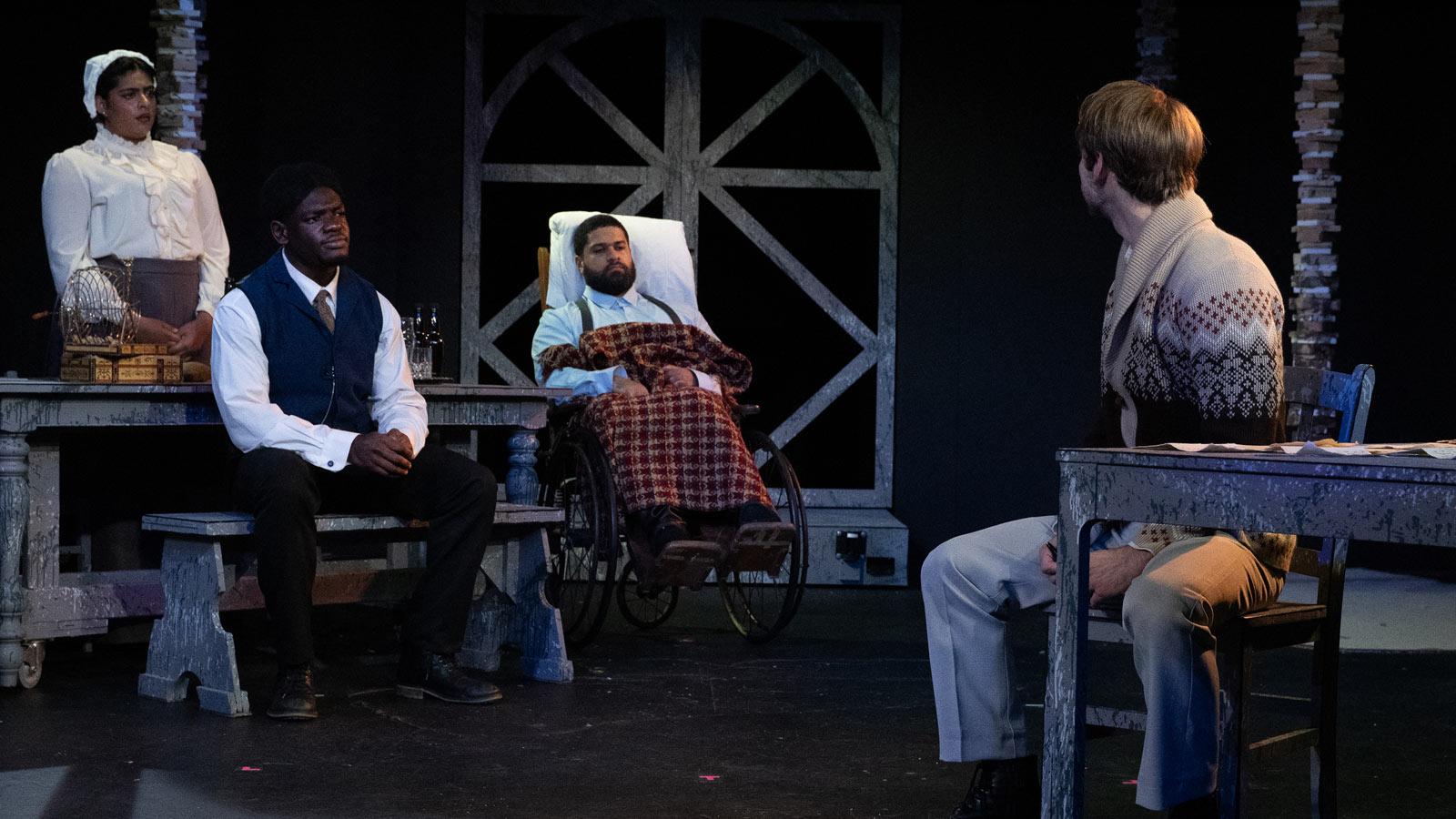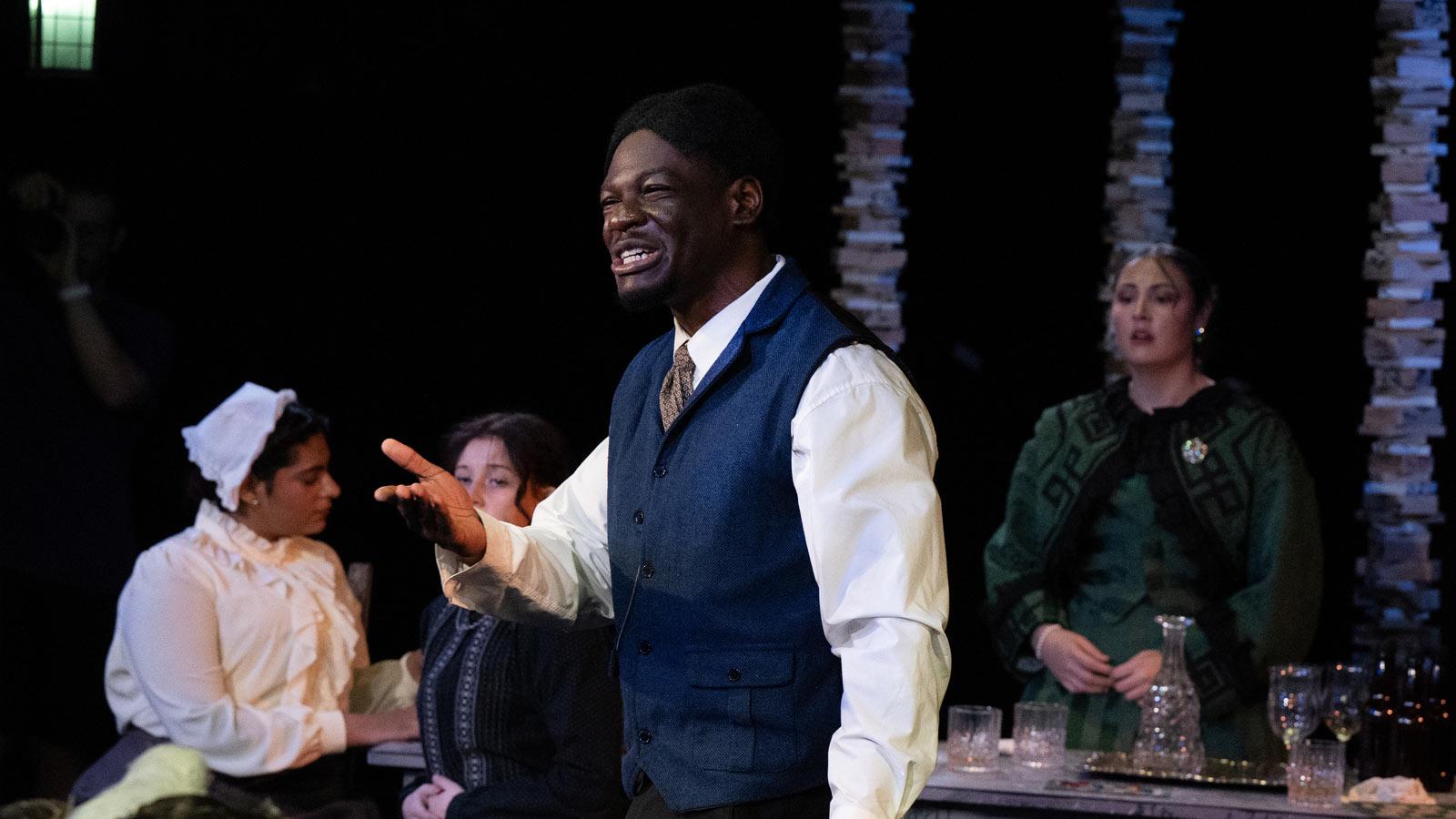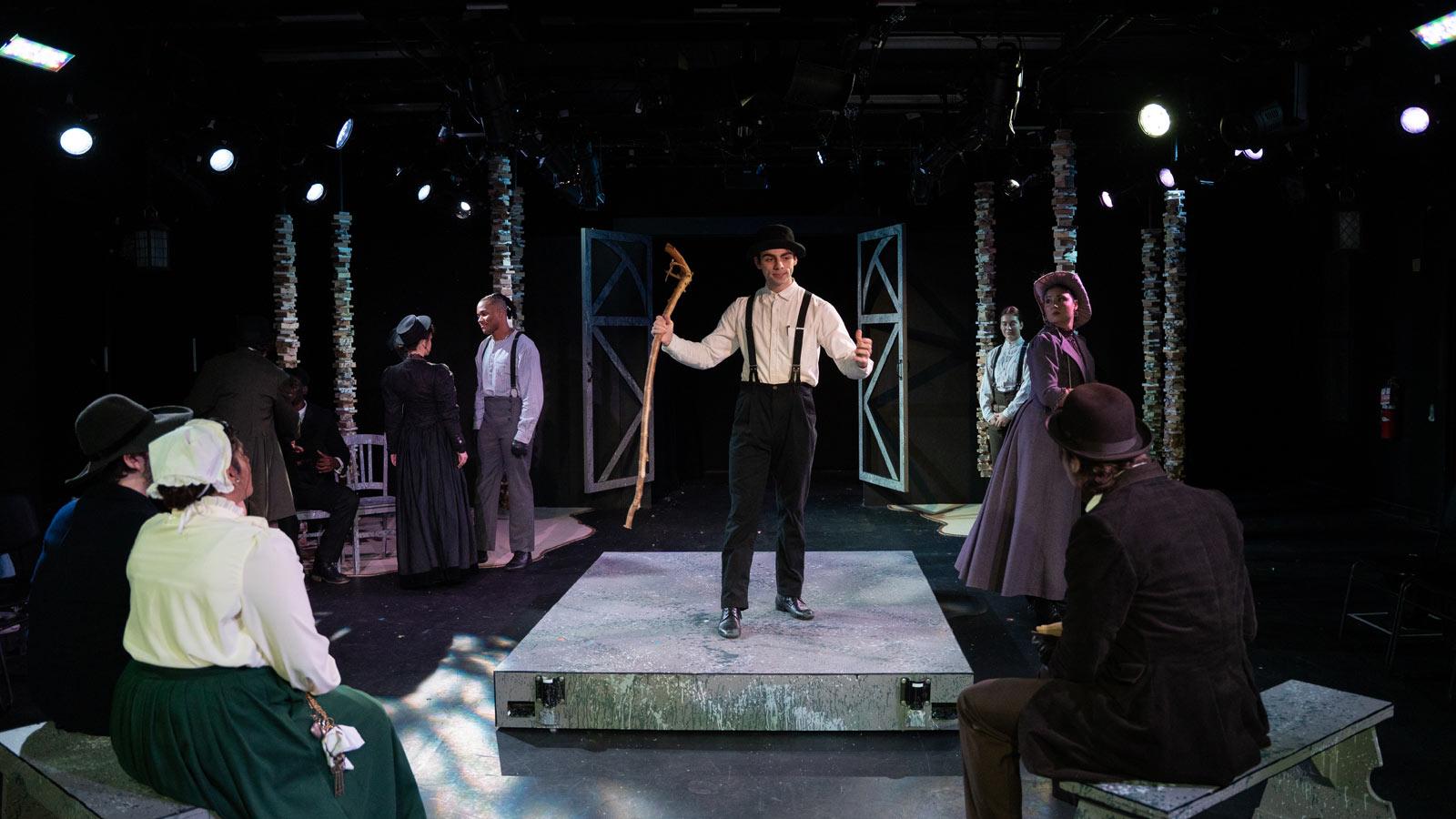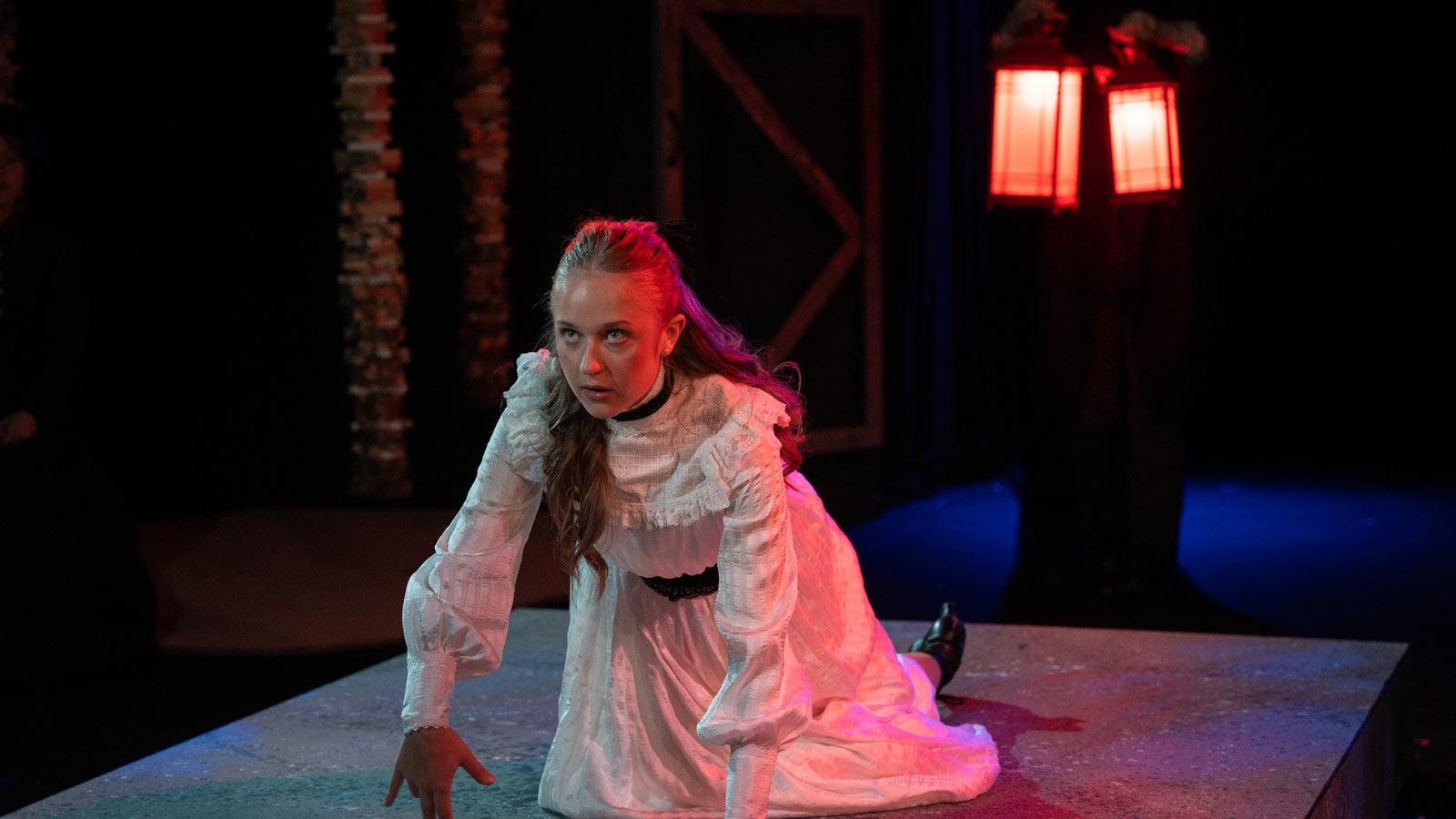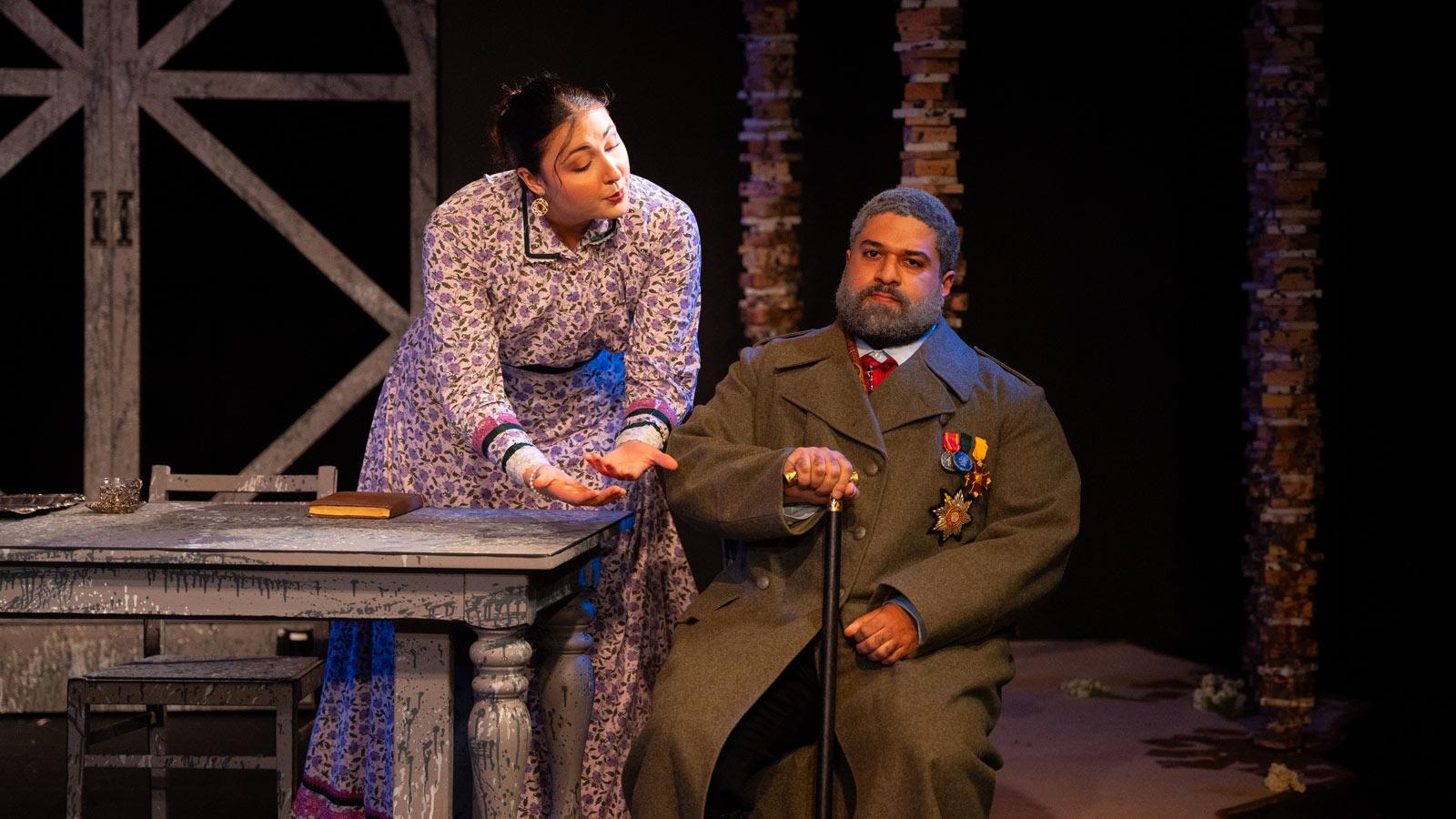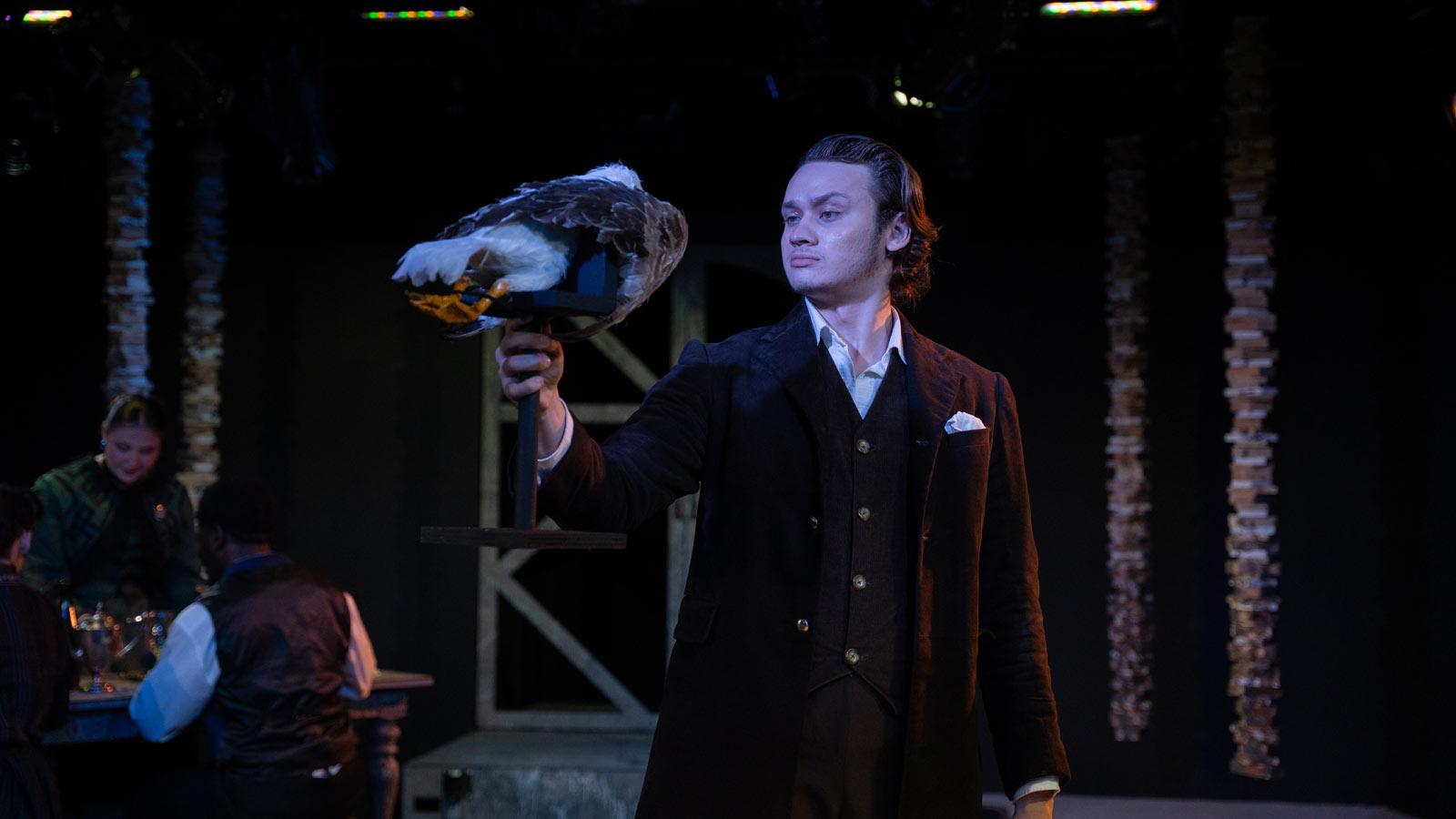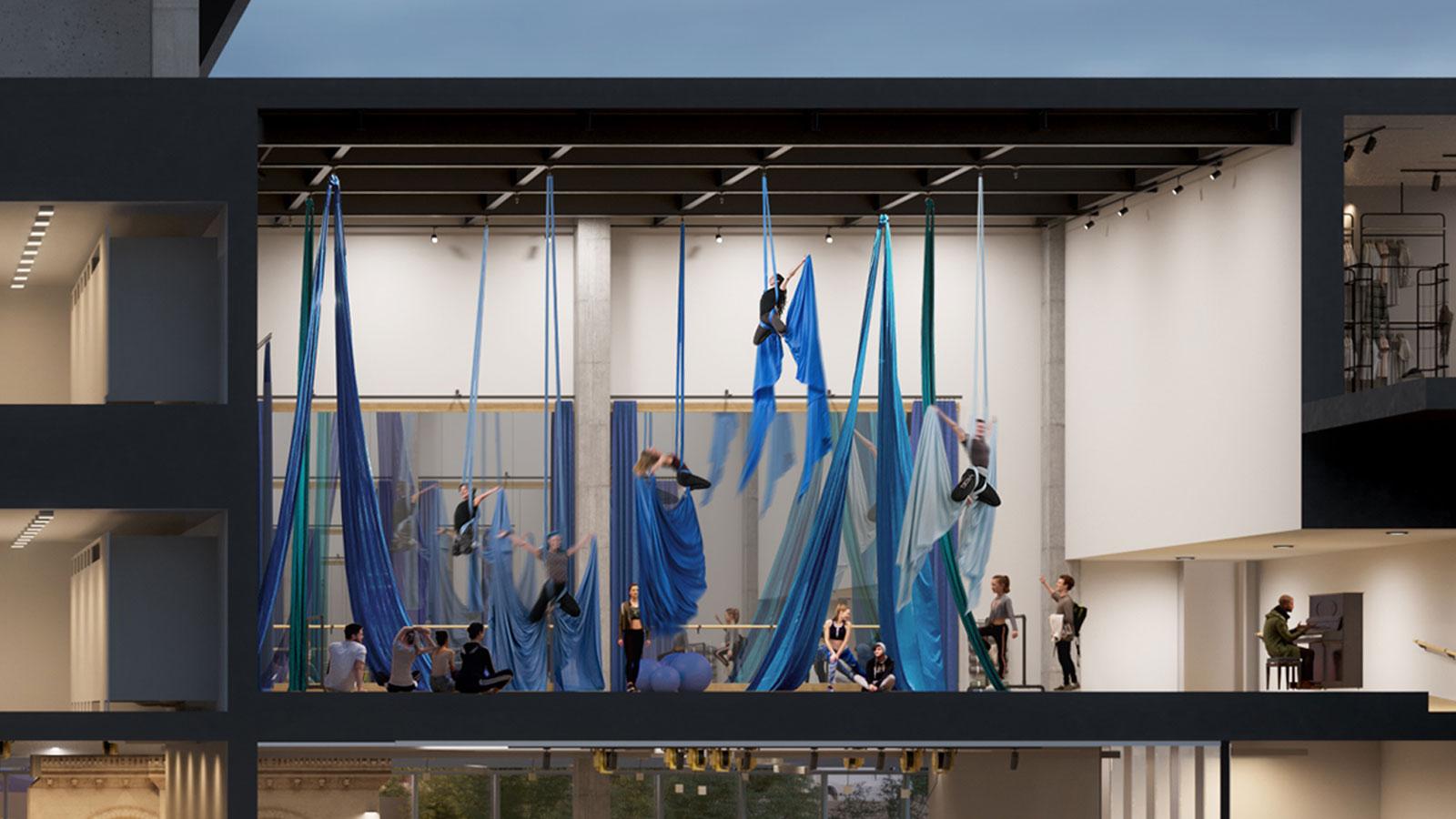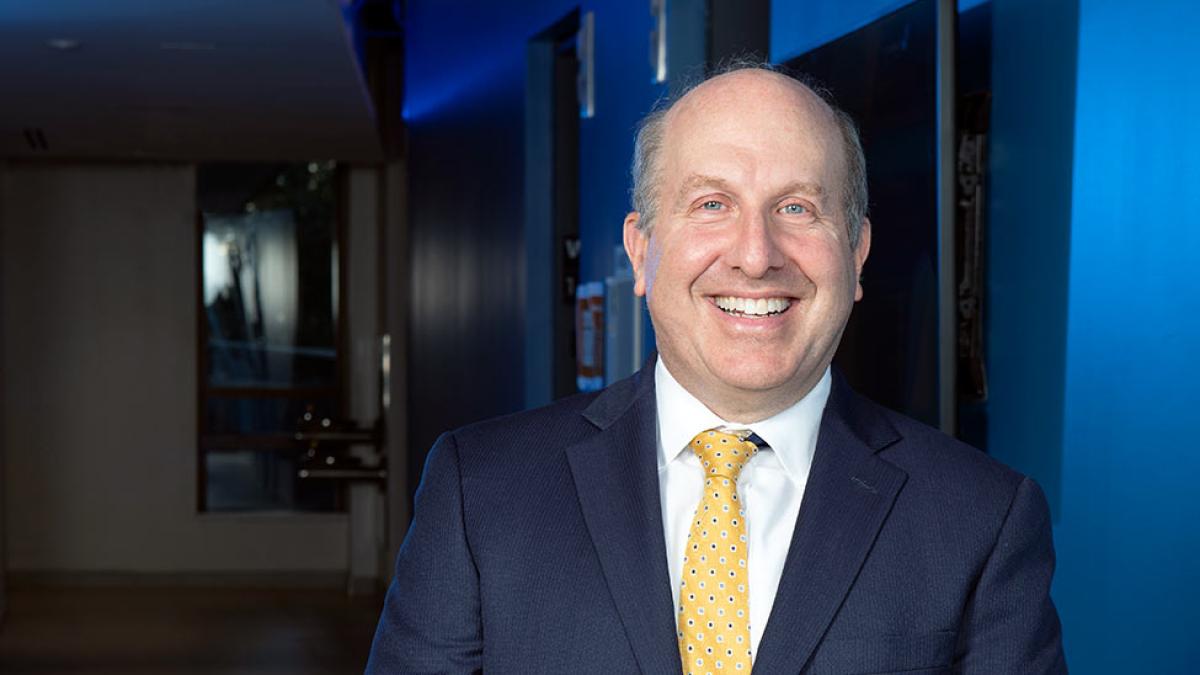Meet the actors, dancers, and designers redefining what it means to be a working artist in New York. From Broadway bows to lighting up Spike Lee films, at Pace’s Sands College, the line between student and professional blurs, and the city itself becomes the classroom, stage, and screen.
The Seagull Takes Flight: A Crash Course in Chekhov
What does it take to bring a classic to life? From first table read to final curtain call, follow along with the cast and crew of Chekhov’s The Seagull as they navigate an accelerated rehearsal process, build a world from scratch, and discover what it means to perform like professionals.
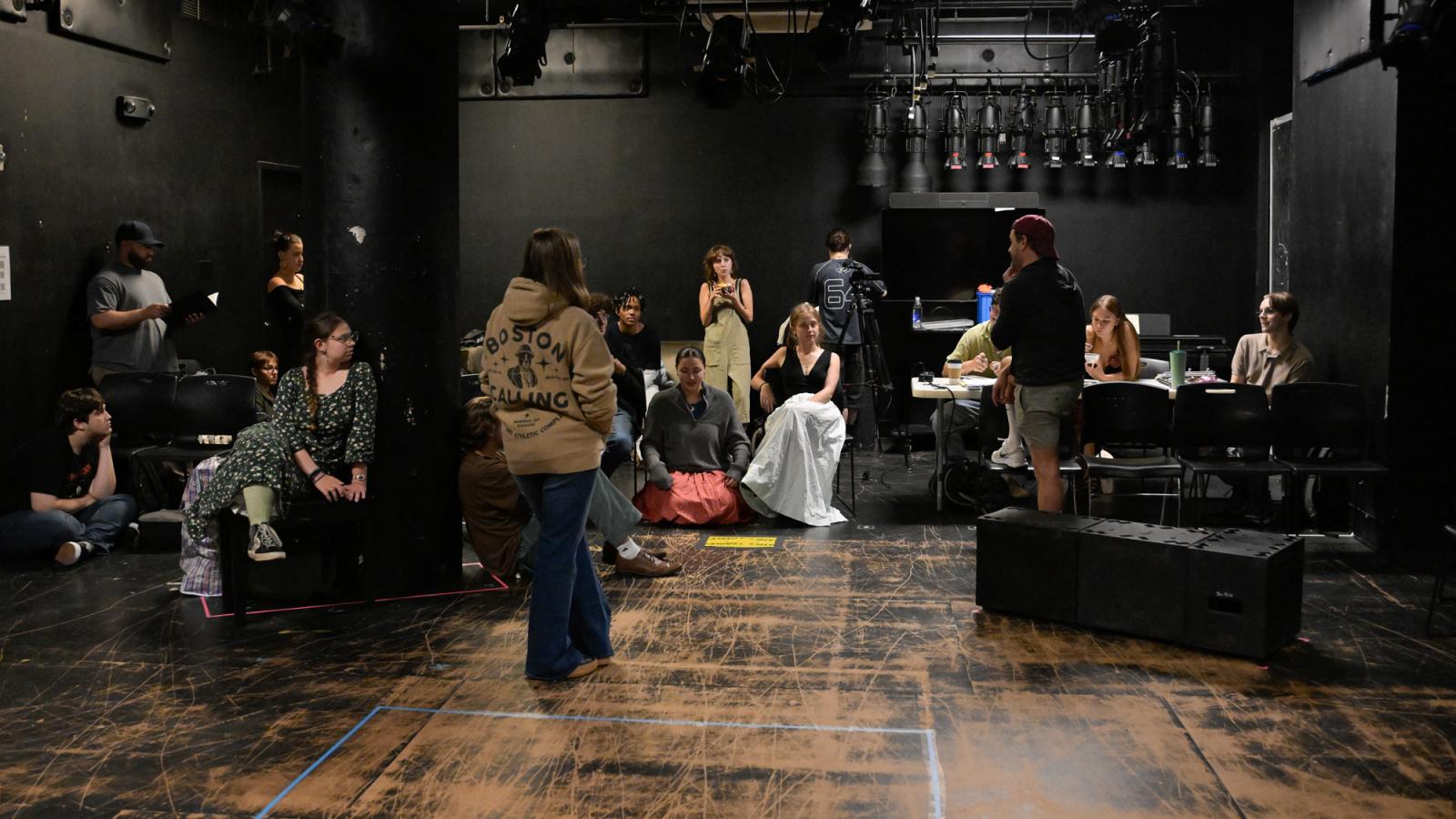
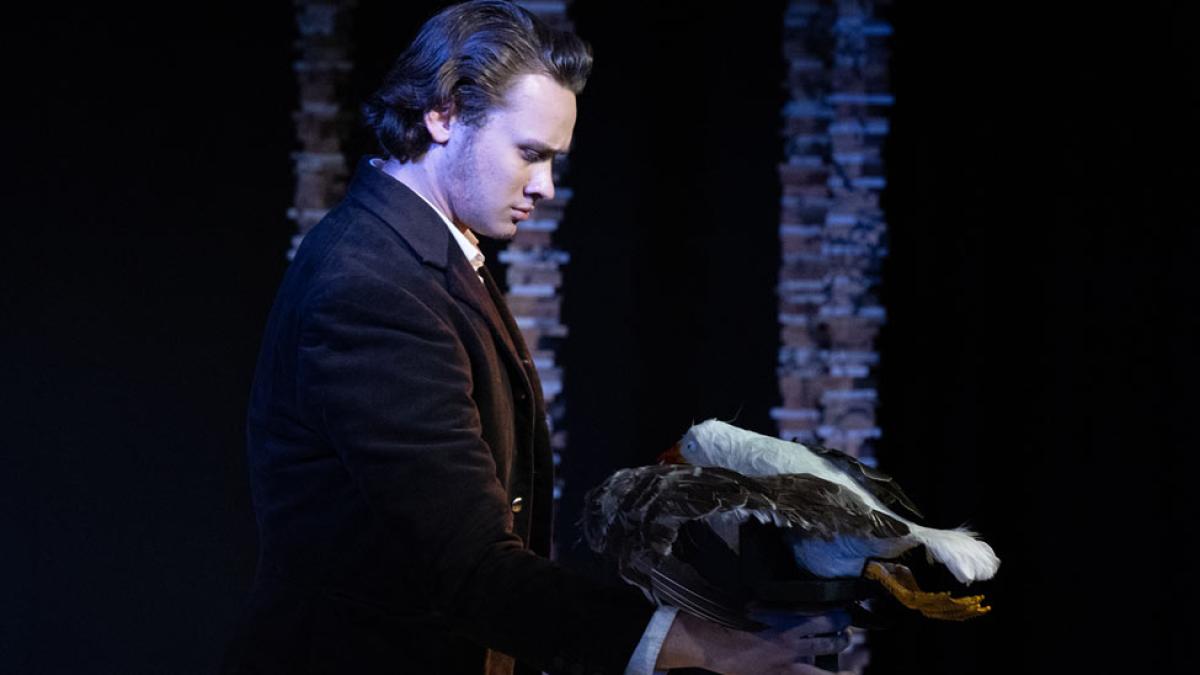
Photography by Jonathan Morrey and Socialite Images.
With only eight shows on the calendar and a one-month build, Pace University’s fall production of The Seagull unfolded like a crash course in making theater fast—and making it together.
For Grant Kretchik, Sands College of Performing Arts professor and chair of the BFA Acting and BFA Acting for Film and Media programs, the production was a masterclass in speed, collaboration, and storytelling. “It’s a little bit of an exception, because it was our first production up this year,” he explained. “So, the production process was exceptionally rapid.”
The show was cast in May and production meetings began July. Knowing their rehearsal was short, the cast worked on table reads over Zoom until the semester began and rehearsals could begin in earnest. The challenge? To stage one of the greatest classic plays in a short matter of weeks. “The cast officially began rehearsals on September 2 and closed the show on October 5,” said Kretchik. “We rehearsed, did a designer run, tech, opened, and closed the show in a month and three days.”
“This production truly taught me so much about being a working performer—the quick schedule, the expectations in the room, the prep work." —Huffman
To put it in perspective, when legendary director Konstantin Stanislavski staged The Seagull in 1898, he had eight months to put it onstage.
Since then, The Seagull has become a rite of passage for many of the world’s most acclaimed actors. Dame Judi Dench, Meryl Streep, and Indira Varma have all taken the stage as Irina Arkadina, while Philip Seymour Hoffman, John Goodman, Christopher Walken, and Peter Sarsgaard brought depth and nuance to Chekhov’s tortured men. Each new production reaffirms the play’s enduring power—and the challenge it poses to every performer who takes it on, with Sands students being no exception.
At Pace, the compressed timeline demanded a level of professionalism rarely expected of undergraduate performers. “This production truly taught me so much about being a working performer—the quick schedule, the expectations in the room, the prep work,” said Emma Huffman ’26, who played Irina. “All of it taught us a lot about this final bridge into the working world.”
Annabelle Delaluna ’26, who portrayed Masha, agreed, adding that the rigor is what sets Sands’ training apart. “One of the major things I applaud Pace for is the pre-professional environment it fosters. The rigorous working environment…replicates a professional contract,” she said. “This quick-paced schedule creates an opportunity to truly be on top of the work that is required of you.”
From Table Read to Final Curtain
The ensemble’s commitment to the process was evident in every rehearsal. “I felt a different sense of urgency and efficiency in the room,” said Max Harrison ’26, who played Constantine. “I could clearly tell from day one that Grant had a great deal of care for this production and knew what he wanted. This allowed for a nurturing environment where we were free to play while still staying true to the text.”
That spirit of care and collaboration while honoring the text helped Huffman unlock one of her most challenging scenes. “One day, we approached the scene in a completely new way, played around with music, movement, and voice,” she said. “The scene finally cracked open for me. It turned from something I could talk about around the table to something I could live in, and it really became my favorite scene.”
Harrison echoed the sentiment that this production helped him reach new levels as an actor. “I had never worked on a production where I was asked to feel so deeply in every performance,” he said. “It was demanding but rewarding. I discovered things about my process. And I furthered my ability to perform under pressure.”
But a production isn’t just performance. A key element to bring that truth to the stage is the production elements that are often built as the play takes shape. The cast breathes life into the text, and the designers create costumes, building sets, designing lights, and curating props that breathe life into the world of the play.
“I had never worked on a production where I was asked to feel so deeply in every performance. It was demanding but rewarding. I discovered things about my process. And I furthered my ability to perform under pressure.” —Harrison
And for the cast, tech week is when they felt their characters fully enter that world. “When we reached tech week, after what felt like the quickest three weeks of my life, I felt the show come to life,” Delaluna recalled. “Putting on our costumes was the day we truly began to sink into our world of The Seagull. Adding the technical elements is just as important as all other elements when bringing a play to life.”
Another key element to any production is collaboration. “Everything you do is a group project,” Kretchik said. “There’s an accountability—not just to yourself—a true accountability to showing up for somebody else and delivering and being prepared and being authentic.” According to him, these productions are more than another line on an acting resume. They’re chances to build the skills that shape strong working artists and well-rounded people: language and storytelling, collaboration and accountability, and the empathy and critical thinking that carry into every part of life.
When the curtain came down on closing night, the production was a success, and the audience was thrilled. The performers had only one regret.
“I just wish there were more shows,” said Harrison.
More from Pace
The future of the arts at Pace is under construction. Inside One Pace Plaza East, Sands College of Performing Arts students and faculty are preparing to create, collaborate, and perform in spaces built for bold ideas and bright lights.
At Pace University, we don’t just train dancers—we train Rockettes. More Rockettes than anywhere else. As the Radio City Rockettes celebrate 100 years of precision and performance, we’re celebrating the nineteen Rockettes and fifteen ensemble dancers who got their start right here at the Sands College of Performing Arts. Their journey from Pace studios to the Radio City stage is pure magic.
From Downtown to Radio City
At Pace University, we don’t just train dancers—we train Rockettes. More Rockettes than anywhere else. As the Radio City Rockettes celebrate 100 years of precision and performance, we’re celebrating the nineteen Rockettes and fifteen ensemble dancers who got their start right here at the Sands College of Performing Arts. Their journey from Pace studios to the Radio City stage is pure magic.


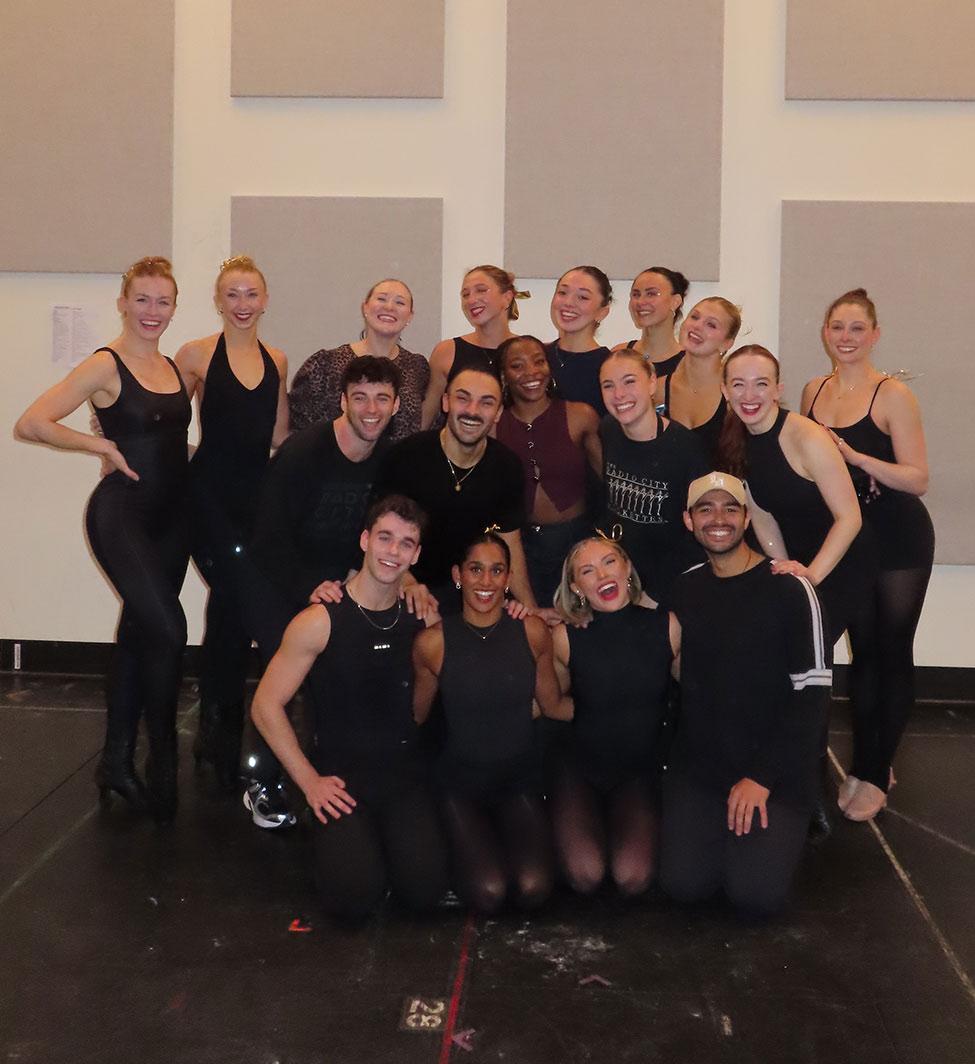
At Pace University, we don’t just train dancers—we train Rockettes. More Rockettes than anywhere else.
As the famed Radio City Rockettes mark their 100th anniversary, Pace proudly celebrates nineteen Rockettes and fifteen ensemble dancers whose journeys began at the Sands College of Performing Arts. Guided by our distinguished faculty, including Rockette alumnae Lauren Gaul and Holly Evans, these performers embody the precision, artistry, and professionalism that define Pace’s Commercial Dance program. From their first classes on campus to the bright lights of Radio City Music Hall, their success reflects the transformative training and mentorship that prepare Pace students to shine on the world’s biggest stages.
Hundreds of dancers audition each year for just eighty-four coveted spots in the Christmas Spectacular, and this season, 20% of those went to Pace students and alumni. Their versatility, grounded in rigorous training across ballet, tap, and jazz, is what sets them apart. At Pace, technique meets opportunity. Our faculty of working professionals help students master the skills, confidence, and creativity needed to thrive in elite companies like the Rockettes and beyond.
- Our Rockettes: Jo Jo Carmichael, Elizabeth Dupont, Hayden Helms, Danielle Jones, Emily King, Kathleen Laituri, Stevie Mack, Maile Makaafi, Breanna Marshall, Sydney Mesher, Svetha Nallapaneni, Madison O’connor, Kelly Peterson, Megan Peterson, Johanna Piper, Maddie Rodrigue, Caitie Russell, Mia Wilson, and Valeria Yamin
- Our Ensemble Dancers: Chris Critelli, Matthew Deloch, Joseph Harrington, Darriel Johnakin, Hadley Koger, Evan Lacombe, Niko Martinez, Brandon Maxwell, Amanda Mitchell, Alec Mittenthal, Kevin Murakami, Gabby Rembert, Makayla Ryan, Michael Santomassimo, and Addie Taron
The Rockettes’ 100th anniversary celebrates a century of precision and performance, but for Pace, it’s also a celebration of the talent, dedication, and artistry that begin right here on our stages, in our studios, and under the guidance of our world-class faculty at the Sands College of Performing Arts.
See the world-famous Rockettes live this season in New York City.
More from Pace
Meet the actors, dancers, and designers redefining what it means to be a working artist in New York. From Broadway bows to lighting up Spike Lee films, at Pace’s Sands College, the line between student and professional blurs, and the city itself becomes the classroom, stage, and screen.
Pace’s Sands College of Performing Arts and Deaf West Theatre are joining forces to make music education more inclusive. Their new artist-in-residence program introduces the first-ever ASL Music Theory Lexicon Project—giving deaf and hard-of-hearing artists equal access to the language of music while training all students to see access as innovation.
What does it take to bring a classic to life? From first table read to final curtain call, follow along with the cast and crew of Chekhov’s The Seagull as they navigate an accelerated rehearsal process, build a world from scratch, and discover what it means to perform like professionals.
From Pace to the Spotlight: Inside New York City’s New Creative Powerhouse
Meet the actors, dancers, and designers redefining what it means to be a working artist in New York. From Broadway bows to lighting up Spike Lee films, at Pace’s Sands College, the line between student and professional blurs, and the city itself becomes the classroom, stage, and screen.


Learning Broadway lines as the audience takes their seats. Designing a Spike Lee “double dolly shot” while Denzel Washington awaits his cue. Cartwheels for luck. Exams between rehearsals.
To the uninitiated, life as an entertainer can look chaotic. But to Pace University’s performing arts students and alumni, it’s all part of the script for life under the lights.
Since 2014, the Sands College of Performing Arts has been preparing the future of Hollywood, Broadway and beyond. The creative crucible of New York City is their classroom, and those who emerge are the dedicated practitioners, leaders, and changemakers shaping the future of stage and screen.
Students at Sands are more than understudies; they’re working professionals who are creating every day. For go-getters like Pace’s Gabriela Campo ’18, Griffyd Cole ’20, Jada Simone Clark ’22, and Mateo Lizcano ’26, that training has been their ticket to the top.
And with a new performance and training center about to open in lower Manhattan, the lights have never been brighter for a Sands graduate.
Risking it All
Among Sands’ core values is the belief that courage and creativity are reinforcing foundations for success. Without a willingness to risk failure, it’s impossible to embrace new opportunities.
It’s a lesson that Gabriela Campo took to heart.
In early 2018, Campo, just 22 and fresh from Pace with a degree in musical theater, was cast as a swing in the Broadway hit musical, The Prom. Her job—the one she trained for—was to cover eight ensemble parts and understudy two leads.
“It is never boring when I go to work,” the Los Angeles native told a reporter at the time. “I kind of feel like Cinderella. I get to go to the ball every night.”
One night, however, her Cinderella dream became all too real. With the audience streaming in, one of the lead ensemble members got violently sick. “It was places. It was standby. The orchestra was about to start, and she runs offstage and starts vomiting,” Campo recalled. “Everyone backstage was like, ‘Well, shit. Who do we put in there?’”

It wasn’t a role Campo was covering, but the stage manager turned to her anyway. “Can you do it?” he asked. Campo didn’t hesitate.
Years later, Campo concedes she didn’t really think about her answer. She was young, poised and confident, freshly anointed with credentials from one of the country’s top performance schools.
Within 10 minutes, she’d learned the lines. In less than 15, she was in costume, and moments later, she was on stage, making her Broadway debut in front of a packed house as Olivia Keating.
“That show shaped my career in a way,” Campo said. “I've been cast in at least two shows since then because of the reputation I earned that night.”
The foundation for Campo’s big break was laid during her years in youth theater in California, and reinforced at Pace, where she surrounded herself with casting-directors and classmates already performing in major productions. During her senior year, one of her professors was a casting director for The Prom. She was invited to audition.
Campo has since climbed her way up the playbill, appearing in the 2020 revival of West Side Story and Beetlejuice, and on television in Billions and FBI: Most Wanted. Most recently, she performed as Frenchy, and understudied Sally Bowles, in Cabaret at the Kit Kat Club. Next up, she’s set to appear in the stage adaptation of Girl, Interrupted, at The Public Theater.
“Pace attracts the kind of person who is willing to be a small fish in a big pond,” she said. “It takes a lot of courage to do that. I know that now.”
A Path Well Lit
For many young artists, graduating during a COVID-19 would have been more frightening than facing an audience with only a few minutes to memorize a part. Broadway was dark during the pandemic, stages empty, and opportunities scarce.
But for Griffyd Cole, a lighting designer and programmer who graduated magna cum laude in 2020 with a Bachelor of Fine Arts in Production and Design, being in New York when the city shuttered turned out to be a stroke of luck.
“Because I already had a network from my time at Pace, I was able to start working as soon as theaters opened again,” Cole said.
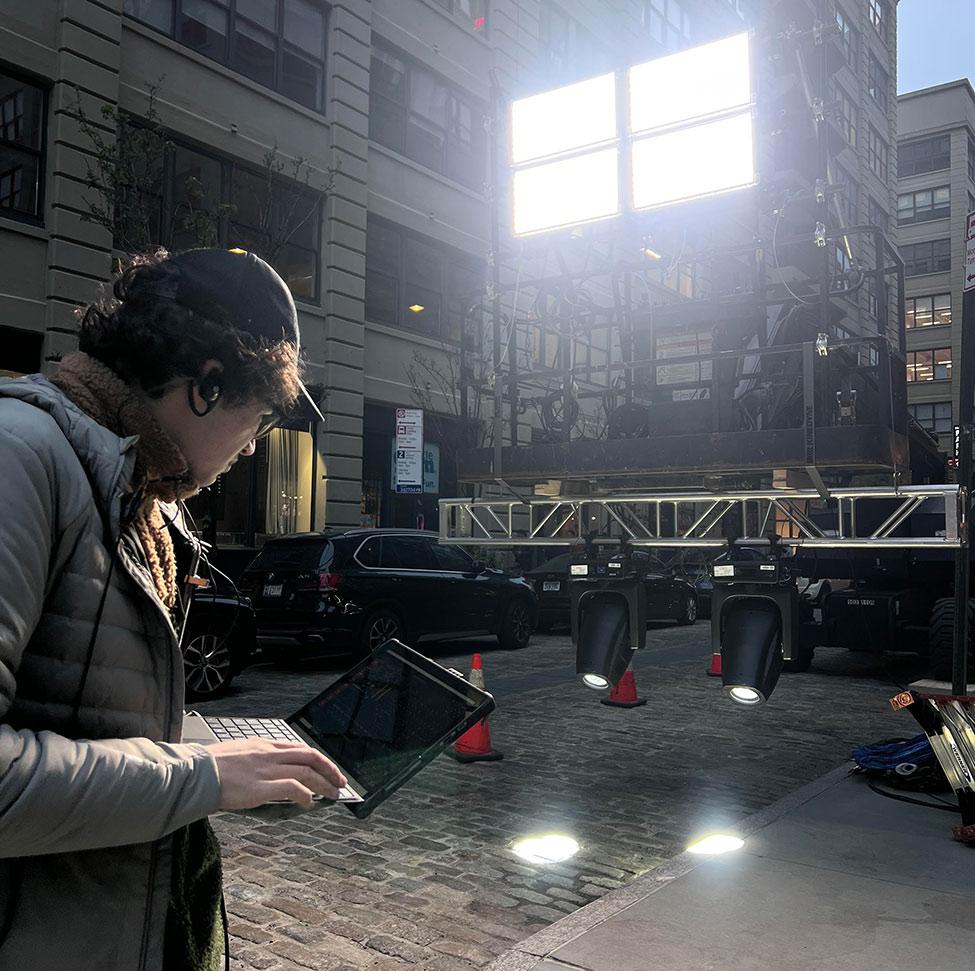
One of his first gigs was as an electrician at the Park Avenue Armory, which reopened with strict testing and socially distanced performances. Then, he got a call from a former colleague with an unexpected opportunity.
“A friend I’d met years earlier on a theater job needed someone for his TV show,” Cole said. That show ended up being the HBO mega-hit Succession. “It was my first TV gig as an electrician—and it just kept going from there.”
Cole’s versatility soon caught the attention of other producers. He just finished work on Darren Aronofsky’s upcoming film Caught Stealing and before that he was the lighting programmer on Spike Lee’s Highest 2 Lowest, starring Academy Award-winner Denzel Washington.
For Cole, Highest 2 Lowest was an opportunity to shine. One scene, toward the end of the film, stands taller than the rest.
“The singer A$AP Rocky had produced a song for the movie, and the director wanted this big, elaborate shot inside the Bronx County Courthouse with a bunch of moving lights and effects,” Cole said.
Cole delivered and earned a credit lighting Spike Lee’s “double dolly,” the director’s signature filmmaking technique.
Pace may not have taught Cole every trick in the book, but it did set him up with the confidence to excel, and the connections to soar.
Still, there is one downside to Cole’s rapid ascent in the industry: watching TV has become a professional hazard.
“It’s hard to work 10 or 15 hours on set and come home and watch more TV,” he said with a laugh. “When I watch something that I’ve worked on, I notice mistakes. But that’s only because I know what happened behind the scenes.”
Measuring Success
For the thousands of designers, choreographers, stage managers, directors, dancers, singers and actors who proudly wear the Pace blue and gold, Sands is synonymous with success.
In 2024, 92% of Sands bachelor’s degree graduates were working in their field of study, and many were leaving their marks on Broadway, where Pace is the fifth-most represented college in the nation, according to Playbill.
Established in 2014 within Pace’s Dyson College of Arts and Sciences, the Pace School of Performing Arts was the first new performing arts school in Manhattan in nearly 50 years. In just over a decade, it’s become a film, television, and theater powerhouse. It was renamed Sands in 2023.
Today, Sands’ alumni are working across the entertainment industry, and Pace graduates have earned credits from Aladdin to Wicked on Broadway, The Americans to The Voice on television, and Black Panther to Superman in Hollywood. Some of the biggest names in the business have worked with, studied at or graduated from Sands, including Chris Briney, Cooper Koch, Dominique Fishback, Jesse James Keitel, Michelle Borth, and Glenn Taranto.
Their success is no accident—it is the direct result of world-class instruction from faculty who live and breathe the industry every day. Students train under working professionals whose resumes span Broadway, Hollywood, and national television.
Susan Aston, who coached James Gandolfini to his Emmy-winning performances on The Sopranos, brings a master’s-level understanding of acting craft and emotional precision into every classroom. Former Joffrey Ballet principal dancer Scott Jovovich infuses his choreography and teaching with the same discipline and artistry that took him from ballet stages to Broadway’s Fosse and Jerome Robbins’ Broadway. Julie Lawrence-Edsell, a Yale School of Drama alumna and accomplished actor and director, grounds students in both the technical and human dimensions of performance. And April Bartlett, an Emmy Award-winning production designer for The Today Show, trains future designers to create with imagination and resilience.
This caliber of mentorship ensures that when Sands students step into the industry, they do so not merely prepared but already performing at a professional level.
Sands’ reputation as a breeding ground for talent is borne from its philosophy: a career in the arts begins the day students arrive, not the day they leave. By combining intensive training with a solid liberal arts foundation, and by encouraging students to work while they study, Sands has become one of the nation’s most respected proving grounds for creative careers.
Igniting the Firecracker
Two things drew Commercial Dance alumna Jada Simone Clark to Sands. Connections were key, and the Baltimore native knew New York was the only city for a promising young dancer with sizable dreams.
But even more important to Clark was Sands’ approach to dance education. Most programs that she’d considered expected dancers to fit a certain mold, to bend to pre-determined formulas, she said. Clark wanted a school that would encourage her individuality.
“When I dance, I light up,” she said. “When it came time to decide on schools, I knew that if I was going to last four years, I needed to be doing something that I cared enough about to dedicate my life to.”
“I was just looking for a place to continue to figure out who I was,” she said. “I didn't know my ‘form.’ I just knew I had more to learn before I hit the ground running.”

Clark began dancing when she was seven. Initially attracted to the athleticism of the craft, her affection grew as she matured, and the physical mixed with the creative.
“When I dance, I light up,” she said. “When it came time to decide on schools, I knew that if I was going to last four years, I needed to be doing something that I cared enough about to dedicate my life to.”
Still, Clark was realistic when she arrived at Pace in the fall of 2018. Dance is a niche profession. Not every dancer will land a job when they graduate. To increase her chances, she diversified, mastering several disciplines to make herself more marketable.
“I absorbed as much as I could before I was kicked out into the real world,” she said.
Clark landed in the “real world” even before she graduated, thanks to Pace’s offerings and its flexibility for working students. She spent part of her junior year in Los Angeles, studying dance and choreography for film. Connections made there landed her a lead role in Denver during her senior year, a five-week run with Rattlesnake Kate, her first musical.
Since then, Clark’s career has taken off. Called a “firecracker dancer” and “one to watch” by Dance Teacher magazine, she performed in the national tour of the Tony Award-winning Jagged Little Pill, and with the singer Doja Cat at the 2024 MTV video music awards. Her Broadway debut, on March 31, 2025, was as Helga in Cabaret at the Kit Kat Club.
Clark blossomed during her run in Cabaret, a period of financial stability and growth that fueled her confidence. Every night before places, she’d visit the front of house, say hello to the staff, and perform a signature warmup down the aisles.
“I’d do two cartwheels before every show,” she said. To calm the nerves and keep things loose. So expected was this act of athleticism that once, when Clark went on vacation, the stage manager filled in and did the cartwheels for her.
Shows close. Broadway is a business. Learning that lesson can be “tough,” she said, especially when it means the paychecks stop coming. When Cabaret went dark, in September 2025, Clark was back in the hunt, looking for her next gig.
Pace helped her here, too, she said. During school, every few months her dance classes would be led by a new teacher, which taught her how to read a room and give a casting director more of what they were looking for.
“Pace prepared us for the unpredictability of our industry,” Clark said. For that, “I’m grateful.”
Lights, Camera, Study!
What separates Sands from peers, students say, is its emphasis on careers. Undergraduates are encouraged to pursue opportunities as they study. Not internships or part-time apprenticeships. Full-time artistic commitments.
“It's almost required,” said Cole. “It puts you a couple steps ahead, because you're building your professional connections when you're in school. That jumpstart is one of the things I’m most thankful to Pace for.”
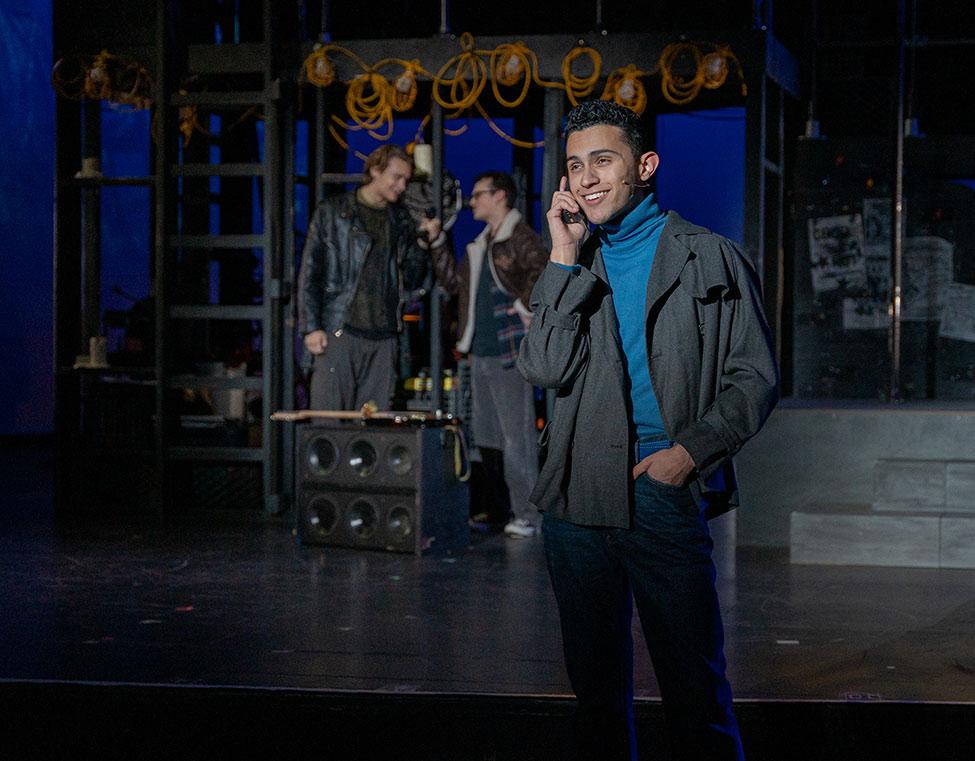
That flexibility is what convinced Mateo Lizcano to choose Sands. A professional actor since he was nine, Lizcano wasn’t about to put his passion—or his salary—on hold for four years. “Pace was a strategic choice,” he said. “Wherever I ended up going to school I needed to continue working.”
Lizcano, now a junior pursuing his BFA in acting, is living that dream. It hasn’t always been easy. In early 2025, Lizcano booked a role in the world premiere of A Wrinkle in Time, but with a catch. The theater was Arena Stage, in Washington, D.C., a six-hour journey from lower Manhattan.
“It puts you a couple steps ahead, because you're building your professional connections when you're in school. That jumpstart is one of the things I’m most thankful to Pace for.”
His professors didn’t hesitate. Arena Stage has produced 22 shows that transferred to Broadway, including Tony Award-winners Dear Evan Hansen and Next to Normal. Wrinkle was Lizcano’s ticket, and Pace wasn’t about to stand in his way.
Rehearsals for the June to July show began at the end of April, just as final exams were about to begin. “My first two weeks of Wrinkle were my last two weeks of sophomore year,” Lizcano said. To make it work, he traveled back to New York several times for classes and tests.
“I was basically doing my homework on the train,” he said. “I was studying for finals, writing papers, and recording presentations that I couldn't do in person.”
It took a lot of checklists to survive those difficult weeks, Lizcano said, not to mention forgiving directors and understanding professors. He was even able to write the missed rehearsals into his contract, to avoid any misunderstanding when he was absent for school.
“I've always put education above everything else,” he said. “But acting is a very close second.”
Doubling Down on the Arts
Each year, more than 600 undergraduates depart Sands with degrees in acting, performance making, dance, theater, production, and design. They enter an uncertain profession. While every actor knows that no show runs forever, threats to arts funding and shifting audience tastes have made it difficult to survive and harder to thrive.
“It's crazy to see Broadway veterans in the same position as me,” Clark said as she shifted from her role in Cabaret back to the job market. “It’s a humbling experience.”
“I went to Pace because I knew it would give me a competitive edge over other performers my age,” said Campo.
But at the same time, there’s never been a better time to entertain. Between 2022 and 2023, the arts and cultural industry added $1.2 trillion to the US economy, and many state and local organizations are filling the gaps amid federal cuts.
Sands College is doubling down on the positives. Next fall, the opening of One Pace Plaza East in Lower Manhattan will add new performance spaces, movement and dance studios, and film and media centers to Sands’ current facilities.
Alumni helped deliver Sands to this moment in its history. Without their ambition, drive and talents, Sands would be just another school. Instead, it’s a powerhouse of the arts—where careers are born and legends made.
“I went to Pace because I knew it would give me a competitive edge over other performers my age,” said Campo.
Some things never change.
More from Pace
At Pace University, we don’t just train dancers—we train Rockettes. More Rockettes than anywhere else. As the Radio City Rockettes celebrate 100 years of precision and performance, we’re celebrating the nineteen Rockettes and fifteen ensemble dancers who got their start right here at the Sands College of Performing Arts. Their journey from Pace studios to the Radio City stage is pure magic.
The future of the arts at Pace is under construction. Inside One Pace Plaza East, Sands College of Performing Arts students and faculty are preparing to create, collaborate, and perform in spaces built for bold ideas and bright lights.
Pace’s Sands College of Performing Arts and Deaf West Theatre are joining forces to make music education more inclusive. Their new artist-in-residence program introduces the first-ever ASL Music Theory Lexicon Project—giving deaf and hard-of-hearing artists equal access to the language of music while training all students to see access as innovation.
Pace Magazine: Past Digital Issues
Missed an issue of Pace Magazine? Catch up with past issues here.


Pace Magazine brings Pace University’s people, ideas, and achievements to life through dynamic, high-impact storytelling. Published twice a year and distributed to alumni, donors, friends of the University, and the entire Pace Community, the magazine highlights the work and influence of our students, faculty, and alumni around the world.
For inquiries or submissions, please email University Relations.
- Summer 2025 Digital Issue
- Winter 2025 Digital Issue
- Summer 2024 Digital Issue
- Winter 2024 Digital Issue
- Summer 2023 Digital Issue
- Winter 2023 Digital Issue
- Summer 2022 Digital Flipbook | Summer 2022 Digital Issue
- Fall 2021 Digital Issue
- Spring 2021 Digital Issue
- Fall 2020 Digital Flipbook
- Spring 2020 Digital Flipbook
- Fall 2019 Digital Flipbook
- Spring 2019 Digital Flipbook
- Fall 2018 Digital Flipbook
- Spring 2018 Digital Flipbook
- Fall 2017 Digital Flipbook
- Spring 2017 Digital Flipbook
- Fall 2016 Digital Flipbook
- Spring 2016 Digital Flipbook
- Fall 2015 Digital Flipbook
- Spring 2015 Digital Flipbook
- Fall 2014 Digital Flipbook
- Spring 2014 Digital Flipbook
- Fall 2013 Digital Flipbook
Rewriting the Script: Q+A with Di Quon Wilms
Assistant Professor Di Quon Wilms is redefining what it means to train for the screen. A seasoned actor, producer, and director, she’s building a program that turns students into working artists—equipped with professional reels, real-world experience, and the confidence to tell their own stories on set and beyond.
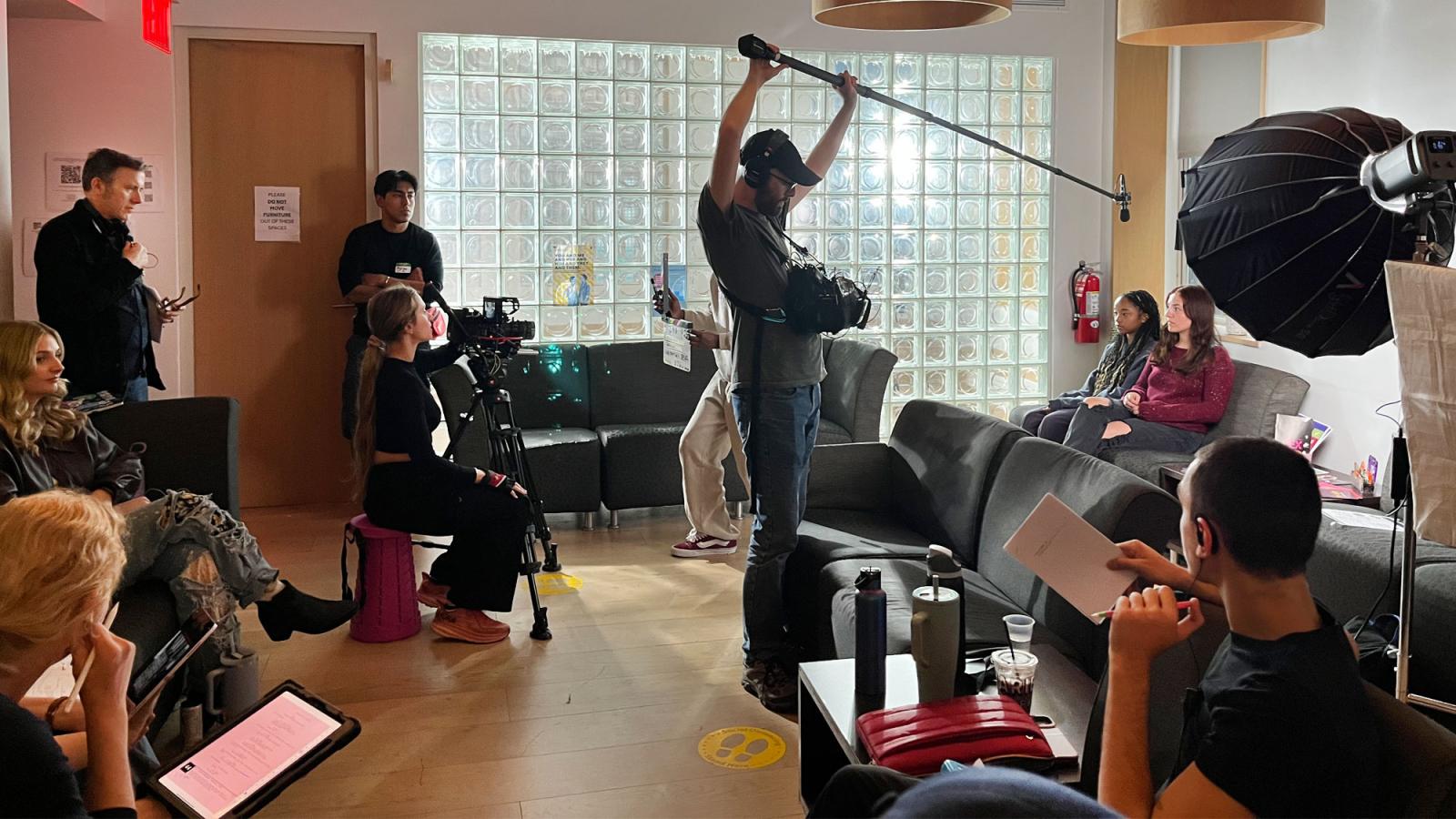


When Di Quon Wilms steps into a classroom or onto a set, she brings more than two decades of experience in front of and behind the camera—and a deep understanding of what authentic representation means in today’s industry. An actor, producer, and director with credits including Maid in Manhattan, Grown Ups, and the groundbreaking My Life…Disoriented—the first Asian American dramedy on television—Wilms has built a career defined by both artistry and advocacy.
Now in her second year as Assistant Professor and now the new Program Head of the BFA in Acting for Film and Media (AFaM) at Sands, she channels that experience into shaping the next generation of storytellers. Having navigated an industry that once offered few roles for women of color, she teaches her students that representation is both personal and powerful. “Every actor is an individual artist,” she says. “Guiding students to find agents and managers who see them beyond stereotyped roles and support them in how they want to be represented is essential.”
For Wilms, teaching is a continuation of her artistic work—a way to merge craft, integrity, and inclusion in an environment that reflects the real world of film and television.
We spoke with Wilms about her journey, her teaching philosophy, and how Pace is preparing artists to thrive in today’s entertainment industry.
Pace University: The BFA in AFaM takes a conservatory-style approach to on-camera training while encouraging students to write, direct, and produce their own work. How does that comprehensive, hands-on structure transform the way students think about storytelling?
Di Quon Wilms: We are far from the days when actors had exclusive contracts with studios. Today, actors often create the stories they perform in. Many are also writers, directors, producers, and entrepreneurs. With so many streaming outlets, content is a commodity; being able to create stories that support their talent not only provides another income source but also gives actors more control over their work.
Pace: The program pushes students to become “multi-hyphenate storytellers.” Why is that kind of versatility so essential in today’s entertainment landscape, and how do you see your students embracing it?
Quon Wilms: Being an actor is about using your body as the instrument to communicate a story. Many students come to this program because we intentionally extend actor training to include the work that surrounds film and media. Actors working in film and media must know how to film themselves for auditions, set up home voiceover studios, and many are content creators as much as they are actors. Our students write the stories they want to be in and see.
If you love acting for film and media, you often love and consume media in general, and allowing yourself to create it in different forms not only builds versatility, it provides another skill set that keeps you in the industry.
I do not believe actors should be waiters or baristas (or have to have “survival jobs”) between acting jobs. I believe they should be filmmakers and producers between acting jobs, continuing their artistic endeavors.
We recently introduced new crew positions into our AFaM films. Our students can take on roles such as Script Supervisor, Assistant Camera, Associate Producer, and more if they are not acting in that film. They are embracing these opportunities to learn on set, and many discover additional creative passions. In the two years I have been here, I have watched students who love acting discover they also have talent and interest in other parts of the industry, and we support and cultivate that.
I expect that over the next five years, the number of graduates with significant successes will continue to grow.
Pace: With New York City as their playground, how do students translate what they learn in class into real-world experiences, whether on film sets, in voiceover studios, or through digital productions?
Quon Wilms: I love New York. When I taught Foundations for first-year students last year, I gave an assignment called “NY as Inspiration.” Encouraging students to go into the city and let it affect and energize them is magical. For our first AFaM film this year, we shot a scene in Times Square—iconic, and the energy is undeniable.
In the program, NYC offers our students professors and mentors who are at the top of their game. They also gain industry connections from within the program. Those gifts are in large part because we are in New York City.
Pace: What do you think makes the Acting for Film and Media program at Pace such a special place for young artists to grow, and what do you hope students take away from their time here?
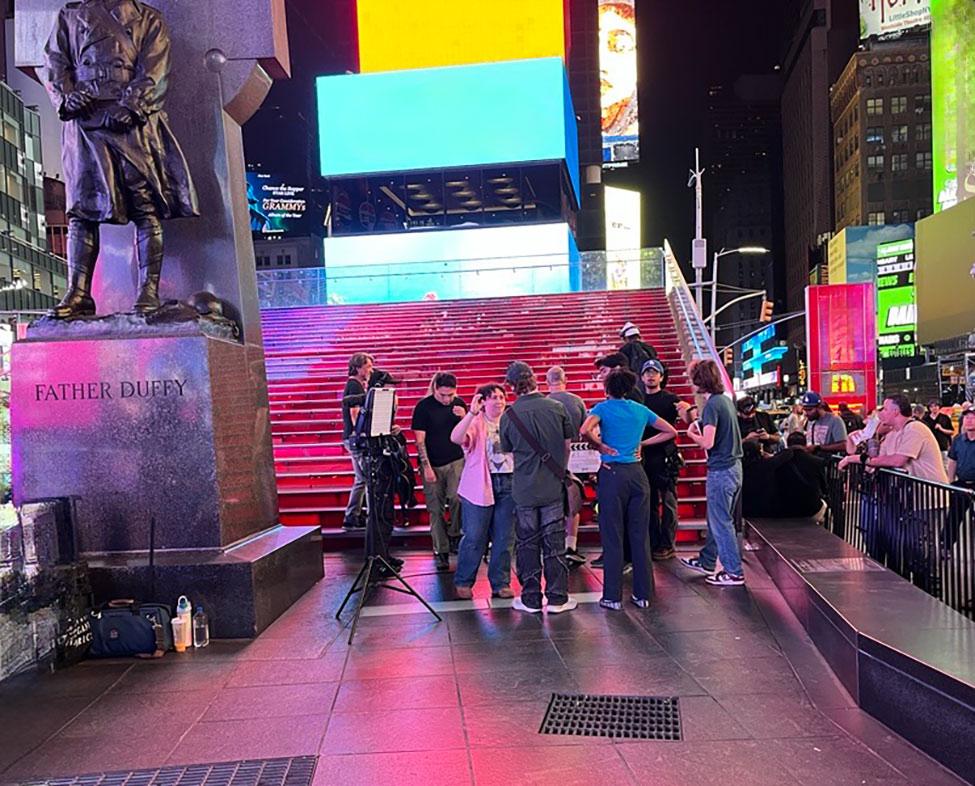
Quon Wilms: What is special about Pace and all of the Performing Arts programs at Sands is the dedication to allowing young artists to truly find themselves. We graduate students who are ready to enter the professional world.
In AFaM, students spend the first year discovering who they are as artists and developing their individual acting process. They grow dramatically as actors, artists, and people in the first two years because we guide them to embrace their individuality. Acting is a craft—it can be taught—but the artistry behind the craft is individual. It is not taught; it is guided.
One thing our students leave with is a piece of reel every year. The pièce de résistance is the Junior Film; they are cast in a festival-quality film with a guest director of note. The films are written with them in mind. Students leave with a reel that allows them to secure agents, managers, and roles. I personally want them to leave with a process and fully developed talent so they are ready to take on any role opportunity. And I hope they leave with a strong sense of self as artists, along with clear boundaries, desires, and a hunger for challenging work.
Pace: Students have opportunities to collaborate with industry mentors, including directors and producers with credits on projects like Ghostbusters and Orange Is the New Black. Who were they, and what impact do these partnerships have on students’ growth and confidence?
Quon Wilms: Our students make "films" every year they are here. And while NYC has many film schools where student filmmakers look for actors, I wanted to make sure their Junior Films were truly professional experiences. To achieve that, we bring in directors with meaningful professional careers—people who are truly working in the industry, both in front of and behind the camera. This year alone, we’ve collaborated with Fred Soffa, a first-call cameraman for major network news; Ivano Pulito, a producer and one of New York City’s go-to locations managers; Amanda Fuller, a lifelong television and film actress who’s now directing for major network television; and Mark Famiglietti, a multi-hyphenate whose most recent screenplay just premiered on Hallmark. Each brings a unique perspective to the process, and together they give our students an authentic, professional experience on set.
They all write, direct, and use these films to nurture and explore their artistic ideas. Working with industry veterans like these ensures an authentic film set environment with complex subject matter, script changes, schedule adjustments, and rigorous 12-hour shoots.
Pace: Students graduate with a professional reel that showcases their work. How does that process prepare them to step into the industry ready to work?
Quon Wilms: It baffled me that one could graduate from an acting program without anything tangible to show except a diploma. Yet I know a lot of students in programs do. Reels are one of the first things agents and managers ask for. They are also essential for online casting platforms.
The dedication that this program has for our students in this area is unparalleled. The process of making these reels—from Year 1 A/B scenes through Senior Showcase—gives them real experience. It’s not just the films themselves that prepare them; it’s the experience of working on set so they can walk onto any set ready to work, whether it’s a small co-star role or a feature film lead.
Pace: The program recently collaborated with MAC Cosmetics. Can you tell me more about that partnership? How do collaborations like that deepen the student experience?
Quon Wilms: In theater, actors mostly do their own makeup. But in film and television, actors do not, since there are makeup artists. Sands doesn’t have a makeup program, but this year one of our students, junior Aubrie Swaenepoel ‘27, who served as a Producer’s Assistant, in that position, secured a relationship with the NY Makeup Academy so their graduates donate time on our films for IATSE union qualification hours. Because experiential learning is embedded in their program, this made a natural fit.
Our program allows students to experience growth not only in their artistry through classes but also professionally through the films they act in, crew on, and develop, as well as through the opportunities they receive within and around the program.
MAC Cosmetics is a strong supporter of diversity and education. They have sponsored other projects I’ve done, so I wasn’t surprised when they donated makeup for all of our films. We also secure sponsorships with locations and food to keep the cast and crew nourished during 12-hour shoots: Kesté, Zucker’s Bagels, Variety Coffee, Grandaisy Bakery, the Meat Locker in New Jersey, and others.
These collaborations mirror real professional partnerships, aligning with brands that represent you as an artist. Often, these relationships start authentically, through places our students frequent or even work at part-time.
The larger partnership I’m developing is with SAG-AFTRA, my union of more than 20 years. Many of our students are already union members. Since we model our films after professional sets, it’s natural that we become a signatory. We expect our spring Junior Films will be under a SAG-AFTRA contract, allowing student actors in them to become SAG-Eligible.
Pace: Can you share a few examples of recent graduates who’ve gone on to find success in film, television, or digital media, and what it was about Pace’s approach that helped them get there?
Quon Wilms: We’ve already seen incredible success stories from our graduates. Chris Briney, for example, has starred in Dalíland and The Summer I Turned Pretty and is also a talented writer, director, and editor. Grace Duah has made her mark on Gossip Girl, and Zachary T. Robbins appeared in the feature film Hard Miles.
But honestly, what excites me as the new head of the program is what I’ve seen in just the last two years. Our students aren’t waiting until graduation; they’re already working. During the summer, they’re acting in films and TV shows, creating their own projects, and channeling their artistic energy into building real careers. Some even come to us with professional experience from childhood, and AFaM helps them make that leap from being “kid actors” to fully realized artists, moving beyond instinct and developing a solid, repeatable process.
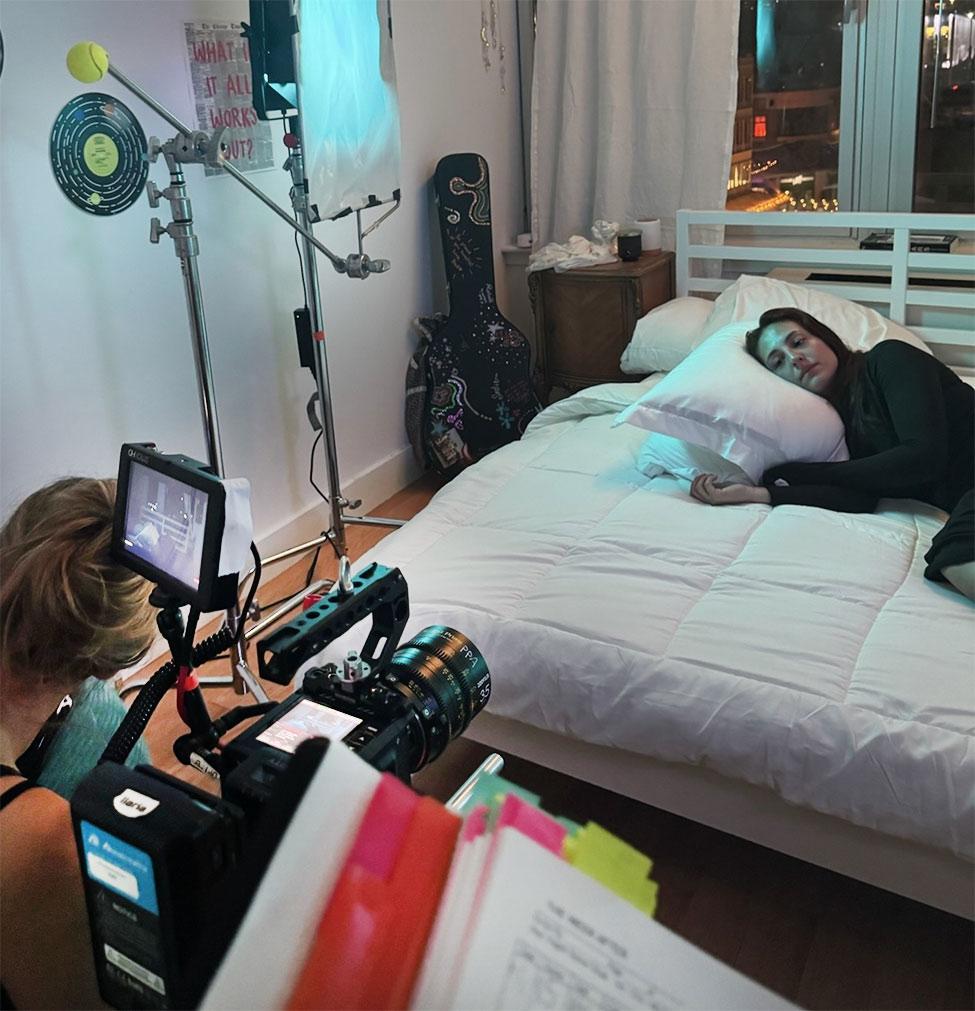
Our program allows students to experience growth not only in their artistry through classes but also professionally through the films they act in, crew on, and develop, as well as through the opportunities they receive within and around the program.
This summer, we had a junior who had never professionally auditioned but was a fantastic actor doing wonderful work in class. I submitted him for a television pilot. He didn’t get the lead role he tested for, but he landed a heavily recurring role and a new agent. Many of our juniors and seniors get agents and roles directly through their professors and the guest artists we bring in.
I expect that over the next five years, the number of graduates with significant successes will continue to grow.
Pace: Sands College has such a collaborative and connected community. How do you help students build relationships with faculty, alumni, and industry insiders that continue long after graduation?
Quon Wilms: I believe a Sands College student’s career begins the minute they enter the program. Their professors may get them their first job or their first agent. We get emails from casting directors looking for specific roles, and we submit our students. Sometimes a student must step away from the program to shoot a series regular or a lead, but this past year, two returned to finish their degrees. It shows the value they see in their education here.
Acting is not something you study once and you’re done. It is a lifelong study.
We bring the industry to the students and instill the work ethic needed for a career. You cannot be late to a film shoot, so you cannot be late to class.
We also have a very noncompetitive approach in the program. You are competing only with yourself and collaborating with other students. Our mentors, faculty, and guests want to see our students succeed. In the last two years alone, professors have brought agents into class who signed students based on their classwork, and casting directors have cast students from recommendations. Those relationships continue long after graduation.
Some of our students who have worked on the Junior and Senior Films have been asked to join other projects by the professionals and mentors they met on set.
I believe a Sands College student’s career begins the minute they enter the program. Their professors may get them their first job or their first agent
Pace: Many universities teach performance, but few combine it so seamlessly with production and storytelling. What sets AFaM apart from other programs?
Quon Wilms: There are two important differentiators. First, we have a deep understanding of the specific challenges of filmed media, especially proximity to the audience. We teach students that in this medium, you have to be authentic, because the camera can tell if you are “lying.” The characters come to you, so self-knowledge is crucial.
The second is the integration of storytelling, hyphenation, and experiential on-set learning, not as an add-on but as a foundation of the curriculum.
This approach was established before I arrived by my predecessors including kA’RAMMU kUSH and by our current chair, Grant Kretchik, and both the current associate head Brendan Hughes and I believe in it wholeheartedly. Around the same time I was offered the position at Pace, I received a book deal with Routledge on this very subject: hyphenation and experiential collaborative learning on the film set.
Pace University and Sands College supporting the production of the AFaM films is truly what sets this program apart.
More from Pace
Meet the actors, dancers, and designers redefining what it means to be a working artist in New York. From Broadway bows to lighting up Spike Lee films, at Pace’s Sands College, the line between student and professional blurs, and the city itself becomes the classroom, stage, and screen.
At Pace University, we don’t just train dancers—we train Rockettes. More Rockettes than anywhere else. As the Radio City Rockettes celebrate 100 years of precision and performance, we’re celebrating the nineteen Rockettes and fifteen ensemble dancers who got their start right here at the Sands College of Performing Arts. Their journey from Pace studios to the Radio City stage is pure magic.
The future of the arts at Pace is under construction. Inside One Pace Plaza East, Sands College of Performing Arts students and faculty are preparing to create, collaborate, and perform in spaces built for bold ideas and bright lights.
Your Backstage Pass to the Future of Pace
The future of the arts at Pace is under construction. Inside One Pace Plaza East, Sands College of Performing Arts students and faculty are preparing to create, collaborate, and perform in spaces built for bold ideas and bright lights.


Inside the construction at One Pace Plaza East, you can already feel the momentum. The sparks, the steel, the sound of something big taking shape: this is where the future of the arts at Pace begins.
Opening in fall 2026, the new creative home of the Sands College of Performing Arts is being purpose-built for imagination in motion. It’s where classroom learning meets the energy of downtown New York City and where tomorrow’s stars find their spotlight.
At its heart is a state-of-the-art performing arts center featuring three dynamic new venues. The reimagined Schimmel Theater—430 seats filled with the next generation of Broadway fans—is where tomorrow’s Broadway stars rehearse today. The black box theater turns “what if…” into standing ovations, and the indoor-outdoor garden theater breaks the fourth wall (literally!), opening to the courtyard for boundary-pushing performances that blur art and audience.
"The renovation of the Performing Arts Center at One Pace Plaza East marks a transformative moment for Sands College and for downtown New York City. With three state-of-the-art theaters, an accessible lighting grid, expansive dance and acting studios, and world-class production spaces, we are creating a hub where innovation meets inclusion," says Jennifer Holmes, PhD, Dean of the Sands College of Performing Arts.
Dive Into the Details of One Pace Plaza East
Just steps away, Pace students build entire worlds in the scene shop, design behind-the-curtain couture in the costume shop, and reach new heights in aerial dance studios where, let’s be honest, when Doja Cat needs dancers, she calls Pace.
And because creativity needs fuel, there’s even a café where group projects turn into coffee dates and pre-show nerves meet caffeine and camaraderie. Plus, this space will double as a concession stand once opening night comes.
But this transformation is bigger than what’s onstage. With all-electric infrastructure, innovative design, and revitalized student housing in Maria’s Tower, One Pace Plaza East is built for sustainability, collaboration, and community.
"This center will anchor a new arts corridor in Lower Manhattan—revitalizing our community, showcasing extraordinary talent, and offering audiences access to groundbreaking, affordable performances," Holmes continues. "We are proud to build a home that reflects the imagination, artistry, and ambition of our students, faculty, and guest artists."
When the doors open, students will step into a space made not just for movement but for momentum. The next act of Pace University’s story begins here—bold, electric, and ready for its close-up.
More from Pace
Pace’s Sands College of Performing Arts and Deaf West Theatre are joining forces to make music education more inclusive. Their new artist-in-residence program introduces the first-ever ASL Music Theory Lexicon Project—giving deaf and hard-of-hearing artists equal access to the language of music while training all students to see access as innovation.
What does it take to bring a classic to life? From first table read to final curtain call, follow along with the cast and crew of Chekhov’s The Seagull as they navigate an accelerated rehearsal process, build a world from scratch, and discover what it means to perform like professionals.
Meet the actors, dancers, and designers redefining what it means to be a working artist in New York. From Broadway bows to lighting up Spike Lee films, at Pace’s Sands College, the line between student and professional blurs, and the city itself becomes the classroom, stage, and screen.
Championing Environmental Action Through Storytelling: Q+A with Taylor Ganis '23
Inspired by her combined undergraduate and graduate studies at Pace, Environmental Studies and Science alumna Taylor Ganis is a children’s book author and founder of a top environmental podcast.
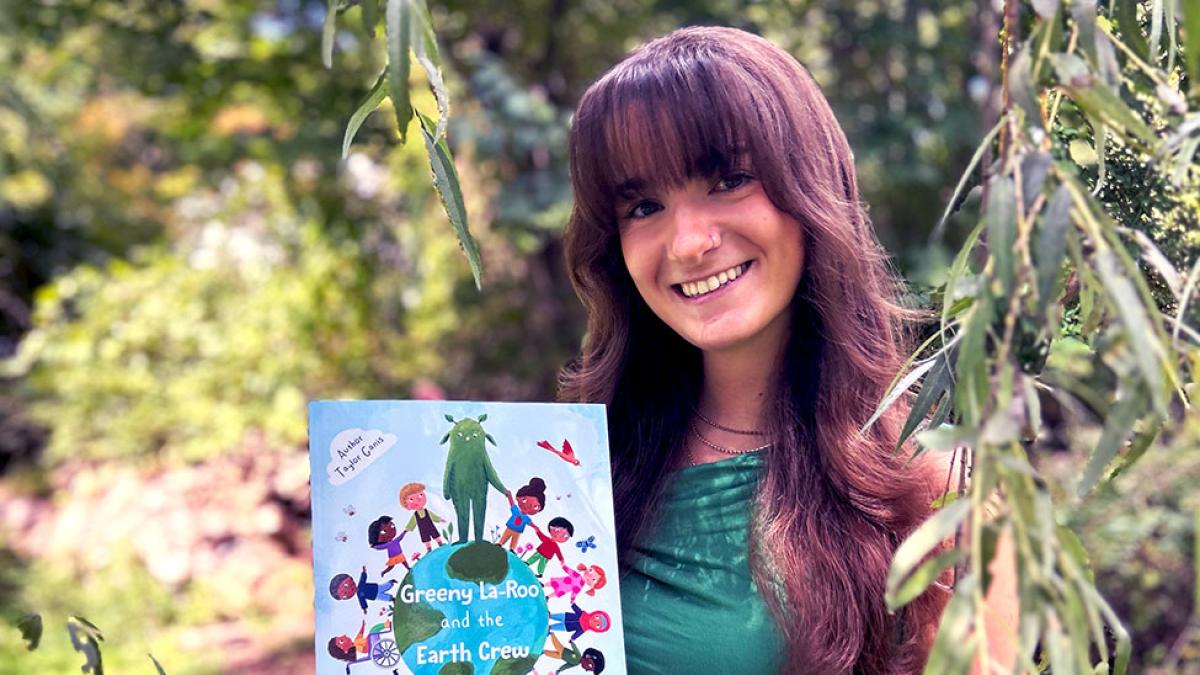

Taylor Ganis
Class of 2023
Environmental Studies, BA/Environmental Science and Policy, MS
You are the author of an environmental children’s book, Greeny La-Roo and the Earth Crew. What inspired you to write this book and what do you hope readers will glean from it?
During my time working as a naturalist for Westchester County Parks at Lenoir Preserve, I had the privilege of teaching children about the environment and the importance of protecting it. I quickly noticed that many existing children’s books with environmental themes focused on awareness, but not on action. As someone who believes deeply in empowering others to make a difference, I wanted to create a story that not only educated young readers but also inspired them to do something. To feel that they could be heroes for the planet, too.
That realization sparked Greeny La-Roo and the Earth Crew, designed to blend imagination, fun, and real-world impact. My hope is that children come away from the story feeling excited, capable, and ready to take small but meaningful actions to care for our Earth.

You graduated from Pace with a combined Environmental Studies, BA/Environmental Science and Policy, MS. How did your studies inspire and prepare you for authoring this book?
My studies were instrumental to the subject matter in the book. I’ve always loved spending time outdoors, but it wasn’t until I began my academic journey at Pace that I truly understood how the places I cherished and the wildlife I was passionate about protecting were being impacted by a changing climate. Through my coursework in environmental studies and environmental science and policy, I gained a deeper awareness of the challenges facing our planet and the interconnectedness between people, nature, and policy. My studies not only provided the scientific foundation for Greeny La-Roo and the Earth Crew but also strengthened my lifelong mission to protect the planet for current and future generations.
You also host a podcast called The Hopeful Environmentalist. Please tell us more about that.
I started The Hopeful Environmentalist (THE) podcast in my college apartment while pursuing my master’s degree at Pace. At the time, I was overwhelmed by the constant stream of bad news about our changing climate and its impacts on people, animals, and the planet. I craved a space that focused on hope, the kind that inspires action instead of despair. As I dove deeper, I realized that while science and policy are essential to solving the climate crisis, they’re often not translated in ways the public can easily understand. So, I created THE to bridge that gap.
Today, the podcast, rated top 11 best environmental podcast in 2023, has listeners in over 35 countries. You can listen to it anywhere you stream podcasts/music.
In addition to being an author, what has your career trajectory been like since graduation?
After finishing my degree, I moved to Washington, DC, to intern at the White House Council on Environmental Quality under the Biden-Harris Administration. I then relocated to North Dakota, where I worked as a contractor for the National Oceanic and Atmospheric Administration on environmental policy, while also a social media assistant, podcast editor, and ultimately, communications coordinator for Our Climate. I soon realized how much I wanted to deepen my skills in storytelling and communication—so I began focusing on THE podcast. Through it, I’ve had the privilege of being invited to speak at the United Nations Conference on Biological Diversity and the UK Mission to the UN, as well as receiving media badges at EarthX’s Congress of Conferences and Climate Week NYC.
Next, I joined the Pace University Gale Epstein Center, where I currently work part-time on water policy initiatives, in addition to as a full-time social media coordinator at Vocal Media.
Through my coursework in environmental studies and environmental science and policy at Pace, I gained a deeper awareness of the challenges facing our planet and the interconnectedness between people, nature, and policy.
Why did you choose to attend Pace?
I was looking for a university that would not only provide a strong academic foundation but also offer opportunities to gain real-world experience and connect with organizations making a difference. The decision to attend Pace proved to be one of the best I’ve made. I gained practical experience in everything from field data collection to conducting informational interviews, and those experiences ultimately helped me earn an internship at the White House Council on Environmental Quality and has set my career in motion.
What activities and organizations were you involved with as a student?
I served as president of the NATURE Club, where I worked alongside a passionate group of students to create hands-on environmental experiences for the Pace community. We organized campus clean-up days, sustainability-focused events, and off-campus trips, including a memorable visit to the Wolf Conservation Center, to give students unique opportunities to connect with conservation organizations. Beyond the NATURE Club, I participated in the Environmental Studies and Science department’s Career Day, which introduced me to mentors and internship opportunities that helped shape the foundation of my career.
What were your experiences like in the Environmental Studies and Science department on the Pleasantville campus? What faculty had been instrumental in your journey as a student?
I truly loved my time in the Environmental Studies and Science department. Every professor I had played a role in shaping the environmentalist I am today by opening doors to opportunities I might never have discovered on my own. However, two professors who had the greatest impact on my journey were Professor John Cronin and Professor Michelle Land. Through their classes and mentorship, I gained a deeper understanding of the policy and advocacy side of the environmental field, a perspective that ultimately helped me secure an internship at the White House Council on Environmental Quality. Their dedication to student success went far beyond the classroom, from organizing mock hearings to helping us build meaningful networks.
What advice would you give to our students, as they navigate college life?
Define your own path and stay open to where it may lead. Also, talk to your professors. Their mentorship and stories can open doors you didn’t even know existed. Further, take classes outside your major, explore topics that spark your curiosity, and seek experiences that fuel your passions, not just your resume. Most importantly, enjoy the process. College isn’t just about preparing for your career, it’s also about discovering who you are, what you care about, and what kind of impact you want to make.
Signing the Future of Musical Theater
Pace’s Sands College of Performing Arts and Deaf West Theatre are joining forces to make music education more inclusive. Their new artist-in-residence program introduces the first-ever ASL Music Theory Lexicon Project—giving deaf and hard-of-hearing artists equal access to the language of music while training all students to see access as innovation.

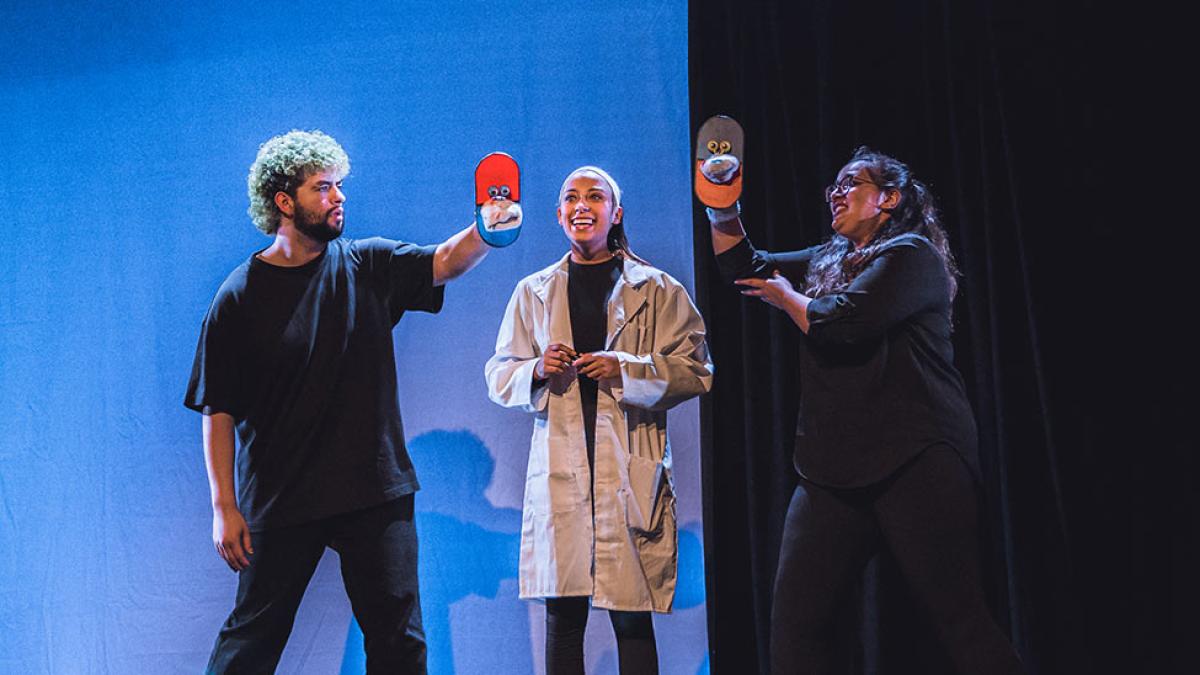
At Pace’s Sands College, a new collaboration is reshaping what access and artistry mean in music education.
This fall, Pace joins forces with Deaf West Theatre, the Tony-honored company known for bilingual productions in American Sign Language (ASL) and English, to launch an artist-in-residence program that redefines access and artistry in musical theater training.
At its center is the ASL Music Theory Lexicon Project, a first-of-its-kind initiative led by Deaf West to develop a comprehensive ASL vocabulary for music theory, making rhythm, pitch, harmony, and notation visually clear and accessible to Deaf and hard-of-hearing students.
“By engaging with Deaf West’s inclusive methods, our students are learning how access and innovation go hand in hand.”
“Sands College of Performing Arts admitted a Deaf student (and an alumnus of our stages) into their prestigious BFA in Musical Theater program for the first time,” said DJ Kurs, artistic director of Deaf West Theatre. “While this is an extraordinary moment, it also raised an urgent question for us: How could we ensure that this student—and the many Deaf artists who will follow—receive equitable access to the musical education their hearing peers take for granted? At Deaf West, we believe access is a creative asset, not a limitation.”
Collaboration in Motion
The residency immerses students in Deaf West’s inclusive performance methods through workshops and rehearsals that merge voice, sign, and movement.
“This partnership exemplifies our mission to prepare students not just for performance, but to be changemakers in the industry,” said Amanda Flynn, EdD, Pace’s musical theater program head. “By engaging with Deaf West’s inclusive methods, our students are learning how access and innovation go hand in hand.”
Supported by an endowed fund that brings visiting artists to campus, this semester’s residency features acclaimed choreographer Jennifer Weber (& Juliet, KPOP, American Idiot) and ASL choreographer Daniela Maucere, who guide students in adapting movement for visual storytelling.
“This residency represents what Sands College of Performing Arts is all about,” said Jennifer Holmes, PhD, dean of Sands College. “We’re building an ecosystem where students learn from visionary artists who are shaping the future of the field.”
Turning Language into Art
Led by Christopher Tester, Christopher Lloyd Bratten-Zappala, and DJ Kurs, the project goes beyond translation to give Deaf artists full access to music theory, not as an accommodation but as a right.
By the end of the residency, students will have gained practical experience with ASL musical staging and learned to approach access as a creative opportunity.
“As both a proud Pace Musical Theater alumnus and a child of Deaf adults, this residency is deeply personal to me,” said Jeff Perri ’12, managing director of Deaf West Theatre. “To return to my alma mater and share our process with the next generation of artists is incredibly special.”
More from Pace
What does it take to bring a classic to life? From first table read to final curtain call, follow along with the cast and crew of Chekhov’s The Seagull as they navigate an accelerated rehearsal process, build a world from scratch, and discover what it means to perform like professionals.
At Pace University, we don’t just train dancers—we train Rockettes. More Rockettes than anywhere else. As the Radio City Rockettes celebrate 100 years of precision and performance, we’re celebrating the nineteen Rockettes and fifteen ensemble dancers who got their start right here at the Sands College of Performing Arts. Their journey from Pace studios to the Radio City stage is pure magic.
The future of the arts at Pace is under construction. Inside One Pace Plaza East, Sands College of Performing Arts students and faculty are preparing to create, collaborate, and perform in spaces built for bold ideas and bright lights.
The Elisabeth Haub School of Law at Pace University Trial Advocacy Teams Excel in Villanova Sports Law Competitions
The Elisabeth Haub School of Law at Pace University Trial Advocacy Program continued its outstanding record of success this fall, earning top honors at two prestigious sports law competitions hosted by Villanova University Charles Widger School of Law. Pace Haub Law Trial Advocacy teams competed in both the Villanova Baseball Filing Day Competition and the inaugural Villanova Law Hockey Negotiation Competition. These Competitions tested students’ negotiation, advocacy, and analytical skills in simulated professional sports settings.
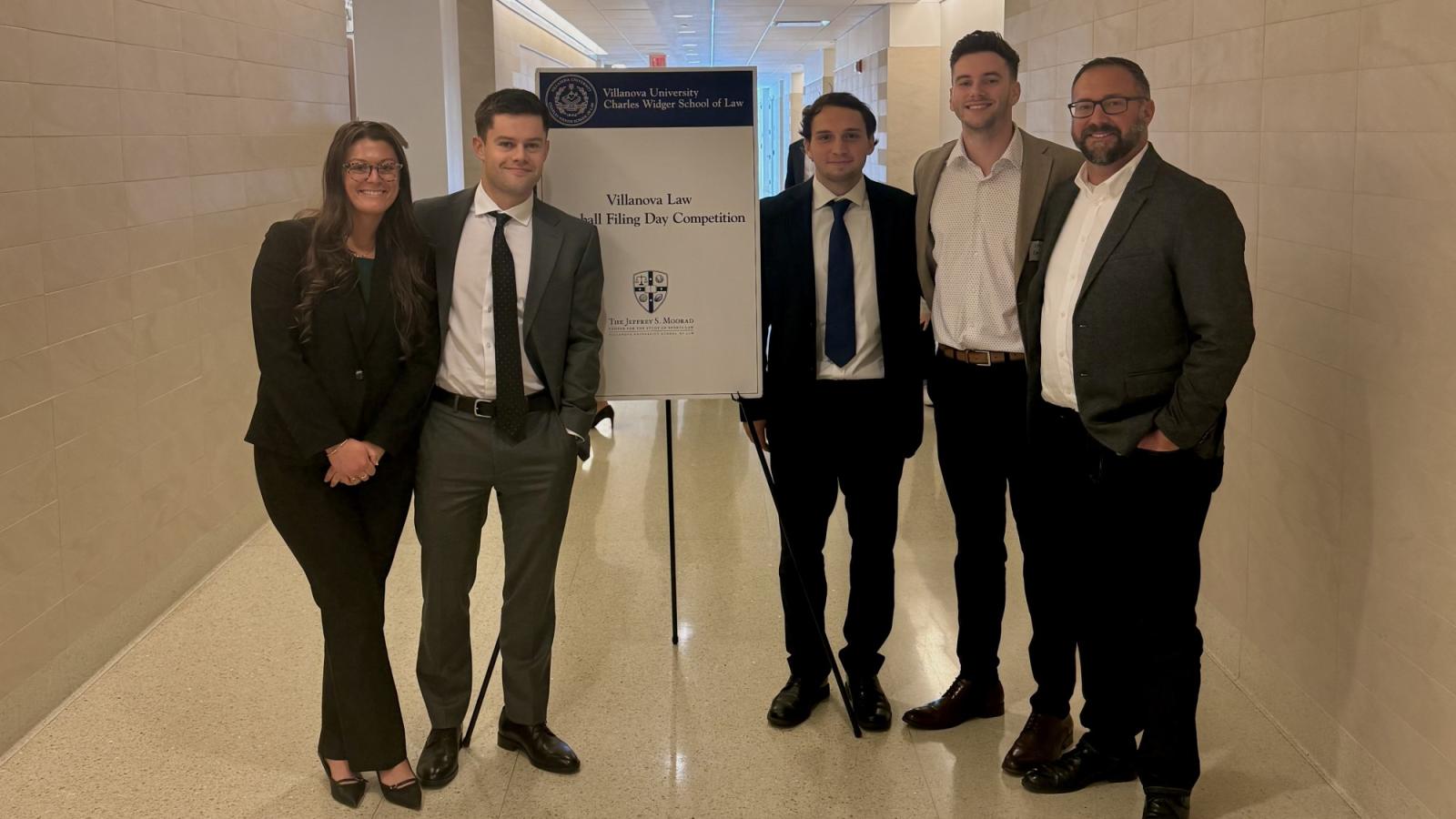
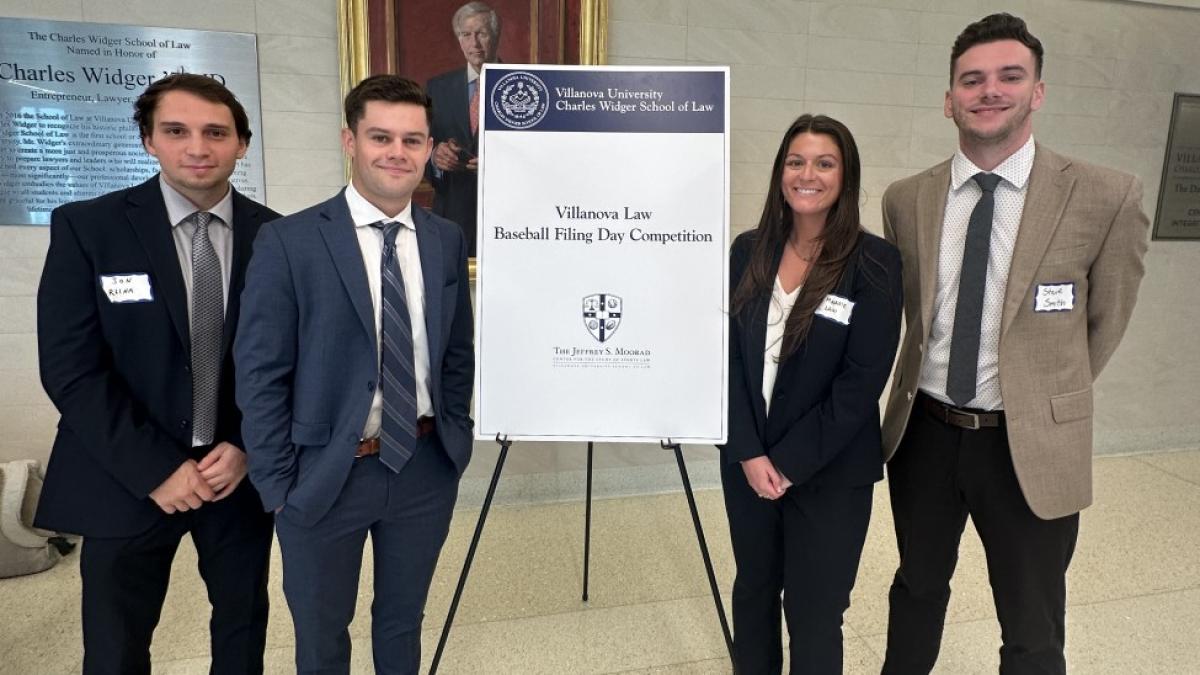
The Elisabeth Haub School of Law at Pace University Trial Advocacy Program continued its outstanding record of success this fall, earning top honors at two prestigious sports law competitions hosted by Villanova University Charles Widger School of Law. Pace Haub Law Trial Advocacy teams competed in both the Villanova Baseball Filing Day Competition and the inaugural Villanova Law Hockey Negotiation Competition. These Competitions tested students’ negotiation, advocacy, and analytical skills in simulated professional sports settings.
Pace Haub Law sent two teams to participate in this year’s Villanova Baseball Filing Day Competition, earning both a first place and a third place finish. Pace Haub Law’s team one finished in third place and consisted of Madeline Law (3L) and Stephen Smith (3L) and team two, finishing in first place, included Brendan McDonough (2L) and Jonathan Riina (2L). Both teams were coached by alumnus Dan Masi ’14, who has successfully coached the team for years and participated on the team as a Pace Haub Law student. Notably, the Pace Haub Law team also finished in first place at the 2024 Competition.
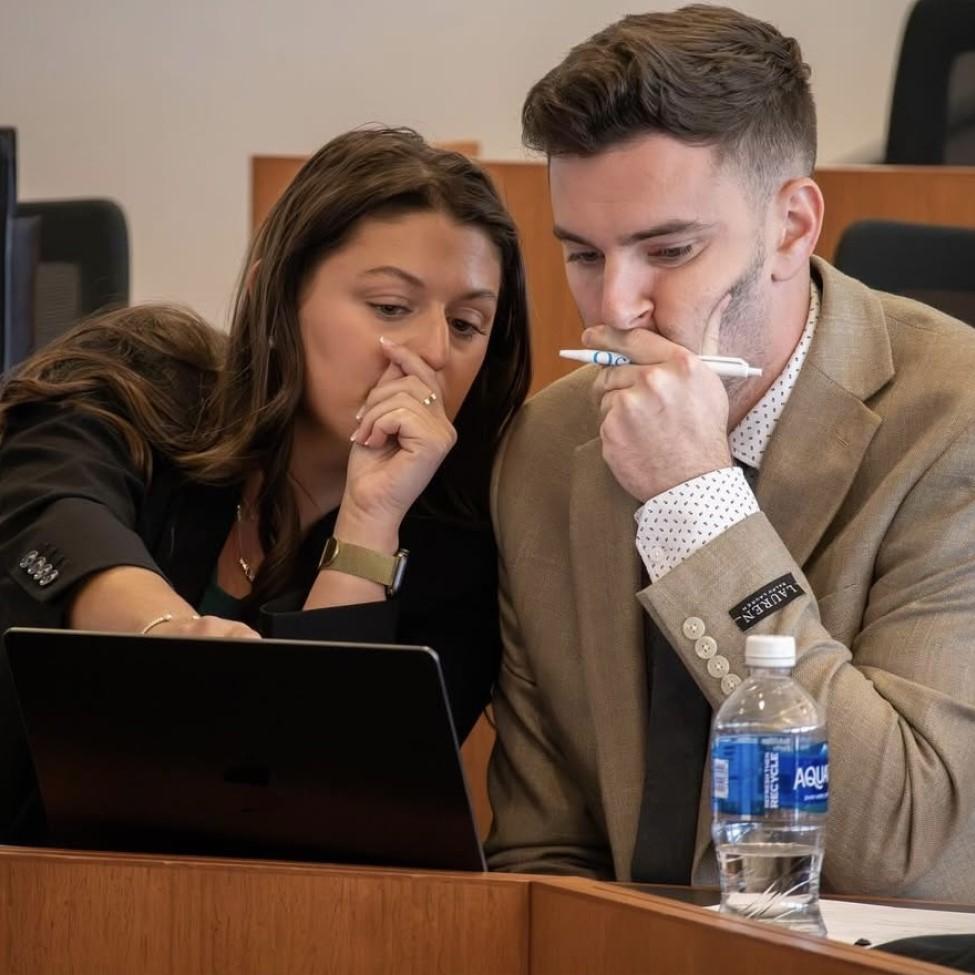
Taking place over the course of two days, the Villanova Baseball Filing Day Competition is a simulated exercise intended to mimic negotiations between MLB Players Association (MLBPA) player agents and MLB club executives before the salary arbitration Exchange Date between the MLB Labor Relations Department and the MLBPA as governed by Major League Baseball's Basic Agreement. “Both of our teams impressed judges who all have a connection to the baseball industry – ranging from player agents, team officials, practicing attorneys, and more,” said Coach Dan Masi ‘14. “Our advocacy teams have made a name for themselves in this competition and marks yet another significant achievement for our trial advocacy program. I am proud of all our competitors for showcasing their negotiation tactics ultimately resulting in a first and third place finish.”
This year marked the inaugural Villanova Law Hockey Negotiation Competition, also taking place over the course of two days. Representing Pace Haub Law were Madeline Law (3L), Brendan McDonough (2L), and Brian Maher-Gurniak (2L). The team finished in first place in this debut event under the guidance of Coach Marc Bisogno ’25, who played a large role in the success of the advocacy program during his time as a student at the Law School. “Since this is the first year that this Competition was held, we were not entirely sure what to expect,” shared team member Madeline Law (3L). “However, with the support and guidance of our team coach, Marc Bisogno ’25, we felt well prepared. We worked as a team over the course of the last couple of months to prepare for many competition scenarios.”
“Our team demonstrated exceptional teamwork, creativity, and professionalism in navigating complex multi-party negotiations,” said Coach Marc Bisogno ‘25. “I am proud of their dedication and ability to successfully strategize and ultimately win this inaugural competition.” During the Villanova Hockey Negotiation Competition, participants tackled a series of real-world inspired negotiation challenges that commonly occur throughout the sports industry, ranging from front office partnerships to player-focused advocacy. Participants’ oral advocacy and negotiation skills were challenged in a series of prompts that will range from host-city to stadium naming rights negotiations. Winners were selected by judges from the hockey industry, including player agents, team officials, and attorneys regularly working in the space.
“These remarkable results underscore the strength of Pace Haub Law’s advocacy curriculum and the dedication of its students and alumni coaches,” said Director of Advocacy Programs and Professor of Trial Practice Louis Fasulo. “Through simulated real-world experiences like these, Pace Haub Law students refine their ability to think critically, communicate persuasively, and negotiate effectively, which are all skills that will serve them throughout their legal careers.”
Through simulated real-world experiences like these, Pace Haub Law students refine their ability to think critically, communicate persuasively, and negotiate effectively, which are all skills that will serve them throughout their legal careers.
—Louis Fasulo, Director of Advocacy Programs and Professor of Trial Practice
In addition to competing throughout the year, students in the Trial Advocacy Program also take on key leadership roles within the organization. This year, Madeline Law (3L) serves as the Alternative Dispute Resolution (ADR) Director for the Pace Haub Law Advocacy Program, a position previously held by her coach in the Villanova Law Hockey Negotiation Competition, Marc Bisogno ’25. As ADR Director, Madeline oversees the ADR branch of the Advocacy Program, supporting student teams as they prepare for competitions. “I feel fortunate to serve in this role,” she shared. “As Director, I regularly check in with team members to provide resources, advice, and support, ensuring that every student has the tools needed to succeed. Directors also help manage team dynamics and logistics, from registering for competitions to facilitating communication with other schools.”
Madeline notes that serving as Director has deepened her understanding of what goes into each competition. “Empowering students to serve in these executive roles,” she added, “is one of the many ways Pace Haub Law’s Trial Advocacy Program prepares its students to graduate confident, capable, and ready to practice.”
January Intersession: Earn 4 Credits in 4 Weeks
Pace’s January Intersession lets you knock out up to four credits in just four weeks—most of it fully online and on your own schedule. Lighten your spring load, stay on track to graduate on time (or early, if you’re an overachiever), and even try something totally new. Cozy vibes and academic progress? Yes, please.
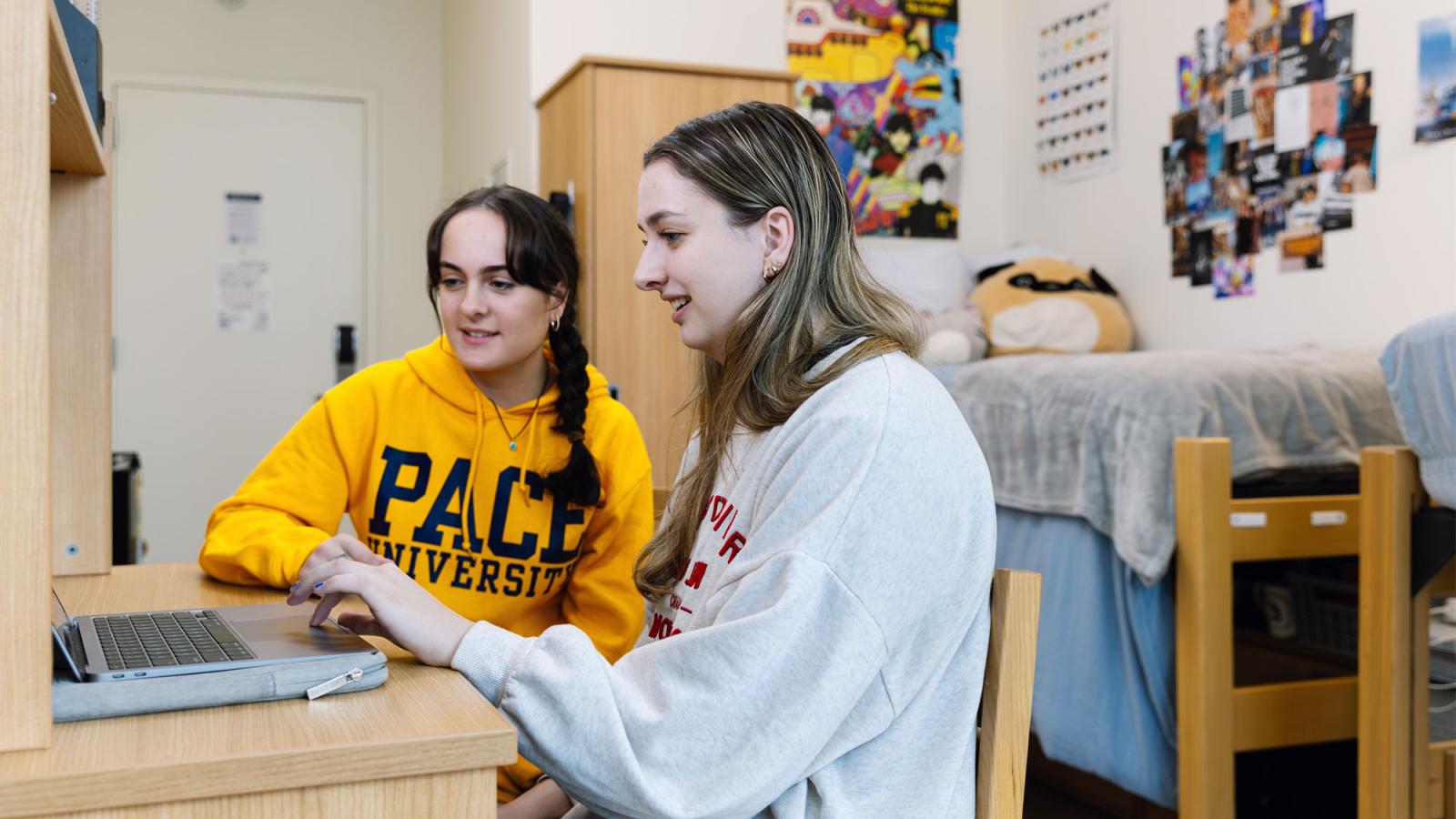
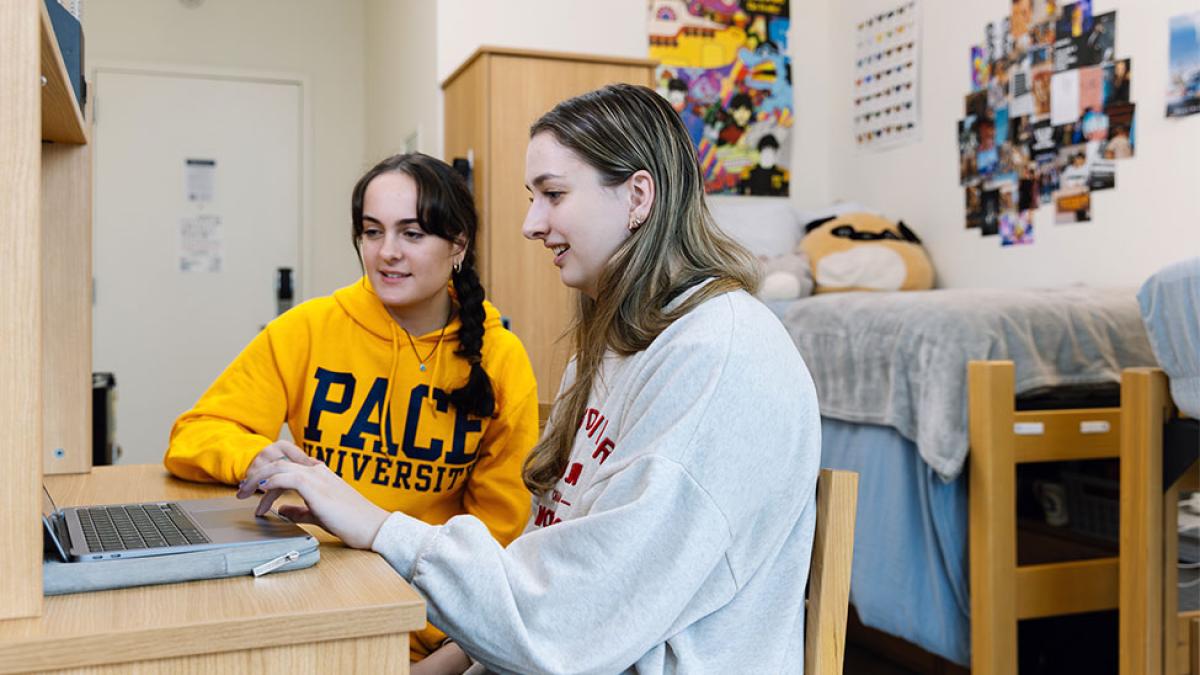
January Intersession is a quick, four-week mini–semester that lands right between fall and spring. It’s your chance to earn credits over winter break—most of it fully online and on your own schedule—so you can keep your momentum going without giving up your cozy-season vibes.
And the best part? You can use this time to explore classes you might not normally have room for. Think Digital Design, Creative Writing, American Sign Language, Psychology of Cultural Diversity, Meteorology, or even Cinema Auteurs of New York City. Want something more foundational? Try Intro to Psychology, World Civilization, or Microeconomics. Looking to get ahead in your major? There are options in Criminal Justice, Communication, Art History, and even Organizational Development and Human Learning for graduate students.
- Registration opened: October 27, 2025
- Classes begin: January 5, 2026
- In-person and hybrid courses wrap: January 17, 2026
- Fully online courses wrap: January 31, 2026
Register for January Intersession
No matter what you choose, January Intersession helps you lighten your spring load, stay on track to graduate on time (or early), and dip into subjects you’re genuinely excited about. It’s flexible, low-pressure, and built to give you a little extra breathing room—academically and in life. Cozy vibes + real progress = a win.
More from Pace
Questions about registration, financial aid, or student accounts? The Pop-Up Student Solutions Centers are your go-to resource as we head into the Spring 2026 semester. No appointments, no stress—just the answers you need to keep moving forward.
Pace President Marvin Krislov pens an op-ed in Newsday about the importance of filing the FAFSA early and not letting uncertainty delay opportunity. Drawing on his leadership at a university committed to access and affordability, President Krislov emphasizes how timely financial aid guidance can help families plan for college success.
Is a master’s in computer science worth it? Explore career paths, earning potential, and how Pace’s programs can boost your tech career.
